
A note at the foot of a page
The Project Gutenberg EBook of Mr. Punch At Home, by Various This eBook is for the use of anyone anywhere in the United States and most other parts of the world at no cost and with almost no restrictions whatsoever. You may copy it, give it away or re-use it under the terms of the Project Gutenberg License included with this eBook or online at www.gutenberg.org. If you are not located in the United States, you'll have to check the laws of the country where you are located before using this ebook. Title: Mr. Punch At Home Author: Various Release Date: December 20, 2014 [EBook #47718] Language: English Character set encoding: ISO-8859-1 *** START OF THIS PROJECT GUTENBERG EBOOK MR. PUNCH AT HOME *** Produced by Chris Curnow, Les Galloway and the Online Distributed Proofreading Team at http://www.pgdp.net
PUNCH LIBRARY OF HUMOUR
Edited by J. A. Hammerton
Designed to provide in a series of volumes, each complete in itself, the cream of our national humour, contributed by the masters of comic draughtsmanship and the leading wits of the age to "Punch," from its beginning in 1841 to the present day

A note at the foot of a page

A First Essay in Housekeeping.—Mr. Jones. "What is it, my pet?" Mrs. J. "This rabbit (sob)—I've been plucking it—(sob)—all the afternoon, and it isn't half done yet!"
MR. PUNCH AT
HOME

THE COMIC SIDE
OF DOMESTIC
LIFE
AS PICTURED BY
F. H. TOWNSEND, LEWIS BAUMER, C. SHEPPERSON, FRED PEGRAM, GUNNING KING, L. RAVENHILL, BERNARD PARTRIDGE, A. W. MILLS, G. L. STAMPA, C. E. BROCK, A. S. BOYD, PHIL MAY, CHARLES KEENE, GEORGE DU MAURIER, AND OTHERS
WITH 130 ILLUSTRATIONS
PUBLISHED BY ARRANGEMENT WITH
THE PROPRIETORS OF "PUNCH"

THE EDUCATIONAL BOOK CO. LTD.
The Punch Library of Humour
Twenty-five volumes, crown 8vo, 192 pages
fully illustrated
| LIFE IN LONDON | RAILWAY BOOK |
| COUNTRY LIFE | AT THE SEASIDE |
| IN THE HIGHLANDS | MR. PUNCH AFLOAT |
| SCOTTISH HUMOUR | IN THE HUNTING FIELD |
| IRISH HUMOUR | MR. PUNCH ON TOUR |
| COCKNEY HUMOUR | WITH ROD AND GUN |
| IN SOCIETY | MR. PUNCH AWHEEL |
| AFTER DINNER STORIES | BOOK OF SPORTS |
| IN BOHEMIA | GOLF STORIES |
| AT THE PLAY | IN WIG AND GOWN |
| MR. PUNCH AT HOME | ON THE WARPATH |
| ON THE CONTINONG | BOOK OF LOVE |
| WITH THE CHILDREN | |


Just because Mr. Punch is eminently representative of all our national characteristics is he something of a good old-fashioned Philistine in his domestic circle. We find him, in his notions of home life, distinctly partial to the cosy comfort that is associated the world over with "The Englishman's Castle." He enjoys the delights of his own fireside, the pleasures of his table, the society of his womenkind, the casual visits of his friends, no less, and perhaps much more, than the formal functions to which the phrase "At Home" is also applied.
"Mr. Punch at Home" is in a sense the complement of "Mr. Punch in Society." It touches on[Pg 6] musical evenings, dances, the social life generally, but more particularly the domestic side of it—the servant difficulty, the humours of the kitchen and the butler's pantry. It gives glimpses of home life in the country as well as in town; among the poor as well as among the rich; in flats and lodgings as well as in suburban villas and the mansions of the West End.
John Leech dealt largely with the servant girl trouble, but as many of his jokes were topical and have lost most of their point with the passing of the topic, and as others have an old-fashioned air with them and are not so smart or so pointed as those by later artists, preference has been given to the moderns.


Things One would rather have left Unsaid.—"You remember that party at Madam Gelasma's, to hear Joachim, Rubinstein, and the Henschels, and De Soria—quite a small party?"
"No; I wasn't there!" "No? Ah—well—it was very select!"
The Greatest Question of the Day.—"My dear, what will you have for dinner?"
Our Whist Party.—Major MacFlush (at close of rubber, to partner). Didn't ye see me call for trumps?
Partner (a new hand). You may have called, Major, but I never heard you!
Undesirable Bric-a-brac.—Family jars.
Mem. for Young Housewives.—To make both ends meet—burn the candle at 'em.
"Pleasant it is when the woods are green," as paterfamilias observed when all the doors in his new villa took to warping.
The Dear Things.—He. You know Jones's wife, an old schoolfellow of yours; tell me, is she musical?
She (her dearest friend). I should say decidedly not, or she wouldn't be so fond of hearing the sound of her own voice.
The Kitchen-Range-finder.—The policeman!
Motto for the Lady of the House.—Don't worry about trifles; make a blanc-mange.
Visitor. "Do you have any difficulty in getting servants?"
Hostess. "None whatever. We've had ten different ones in the last month!"

Domestic Economy.—Cook. "Wasteful, mum? Well, mum, that's one thing I'm not! Why, everythink in the eatin' an' drinkin' way that comes down from hupstairs, I make a point of finishin' up myself, mum!"
The Lady and Gentleman Help Association can find excellent positions for—
A Lady Help with twenty thousand a year, who can help her husband to enjoy existence.
A Lady Help with deft fingers, who can open oysters, peel walnuts and prawns, and make toast.
A Lady Help who can draft a speech that will suit an ex-Secretary of State at a Social Science Congress.
A Lady Help who can do the same for a mild and moderate Bishop at a Church Congress—extra wages will be given for assistance in the composition of charges.
A Lady Help who can drive Four-in-Hand, for a coach to be started from Hatchett's Hotel to Coventry.
A Lady Help who is absolutely helpless—none need apply unless they can show that they are good for nothing.
Also—
A Gentleman Help who can nurse babies, and comb their hair carefully.

The Compensating Circumstance.—Sympathetic Visitor. "Poor dear Mr. Smith, how he must suffer with all that sneezing and coughing." Mrs. Smith. "He does, indeed; but you can't think how it amuses the baby!"
A Gentleman Help who can choose good cigars, and assist in smoking them.
A Gentleman Help who can work a sewing machine and a private apparatus for the distillation of whiskey.
A Gentleman Help who can assist the Sultan of Turkey to pay the interest on his debts.
A Gentleman Help who can help the clerk of the weather to turn on a little more sunshine.
At the Smithson's Dance.—Young Innocent. "I beg your pardon, did I tread on your foot that time?"
Sweet Girl (very sweetly). "Oh, no, not that time!"
"Mary, there's three months' dust in the drawing-room!"
"That isn't my fault, mum. You know I've only bin here a fortnight!"

"You're dreadfully untidy again, Mary! I don't know
what the baker will think of you when he comes."
"The baker don't matter, 'm. The milkman's bin!"
Doctor (to Mrs. Perkins, whose husband is ill). "Has he had any lucid intervals?"
Mrs. Perkins (with dignity). "'E's 'ad nothink except what you ordered, Doctor!"

T'other Way Round.—He. "That's Lady Passeh. She's got an action on at the courts, asking for £5,000 damages." She. "Damages! I should have thought she'd have asked for repairs."

The Eye as an Aid to the Ear.—Young Lady (repeating conversation to deaf old gentleman). "Miss Frills says it gave her such a fright." Deaf Old Gent. "Eh? I didn't quite—" Young Lady. "Such—a—fright!" Deaf Old Gent. "Ah, yes—I agree with you—so she is!"
Why, Naturally.—"Cook, ought I to write Salvation Army in converted commas?"
Orthodox.—The Rev. Alexis Tonsher (going round his new parish). "Of course, you observe Lent, Mrs. Rickyard?"
Mrs. Rickyard. "Oh, yes, sir, we allus hev pancakes o' Shrove Tuesday!"
An Excuse.—Mistress. "Another breakage, Jane? And a wedding present, too! How ever did you do it?"
Jane (sobbing). "They al—ways break—when I—drop 'em!"
Appreciative.—Amateur Tenor. "I shall just sing one more song, and then I shall go."
Sarcastic Friend. "Couldn't you go first!"
"Entering the Social Circle."—Making the first cut into a round of beef.
He. "What pretty hair that Miss Dashwood has—like spun gold!"
She (her rival). "Yes—fourteen carrot."

Mabel. "We always do this when mater's out, uncle. Saves all the bother of talking. Ripping idea, isn't it?"

A CHEERFUL PROSPECT
General Blaxer. "Ah, partner, do you—er—discard from—er—strength or weakness?" Mr. Mildman. "Er—er—generally from fright!"

The Mere Man. "I—er—leave it to you." His Partner. "Coward!"
Things One would rather have left Unsaid.—Tomlinson. "Good-bye, Miss Eleanora——"
Miss Eleanora. "But you've already said good-bye to me, Mr. Tomlinson?"
Tomlinson (who is always ready with some pretty speech). "Have I, really? Well, one can't do a pleasant thing too often, you know!"
Feline Amenities.—Fair Hostess (who is proud of her popularity). "Yes; I flatter myself there's not a door-bell in the whole street that's so often rung as mine!"
Fair Visitor. "Well, dear, I had to ring it five times!"
Bachelor Housekeeping.—Mr. Brown. "Pray, Jane, what on earth is the reason I am kept waiting for my breakfast in this way?"
Jane. "Please, sir, the rolls isn't come, and there's no bread in the house!"
Mr. Brown. "Now, upon my word! How can you annoy me with such trifles? No bread? then bring me some toast."
[Exit Jane in dismay.
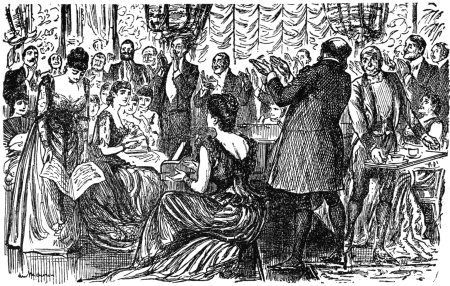
Social Insincerities.—His Lordship (vociferously, with the rest). "Brava! Encore! Go on! I could listen all night!" (Aside, to footman). "Just see if my carriage is come. Look sharp!"
To destroy black-beetles.—Turn a pack of fox-hounds into the kitchen.
To cure smoky chimneys.—Discontinue fires.
To get rid of ghosts.—Use disinfecting fluid copiously.
To expel dry-rot.—Soak the places affected with the finest dry sherry.
To get the servants up early in the morning.—Send them to bed early at night.
To revive the fire.—Tie up the front-door knocker in a white kid glove.
To prevent the beer going too fast.—Possess the key to the mystery.
To avoid draughts.—Don't take any.
To destroy moths.—Collect butterflies.
How to keep plate clean.-Wrap it up in silver paper.
How to dispose of old newspapers.—Put them into the brown study.
The Most Continuous Break We Know. Our housemaid's.

The Duchess (who takes a great interest in all her servants, and has a large house-party). "Oh, so you're the new scullery maid. I hope you like your place?" New Scullery Maid. "No, my lady. I want to leave next week. I can't stand these late dinners. All the ladies as I've ever been connected with have just took a bit of something in their 'ands, and there wasn't all this washing up!"
Latin at the Bridge Table.—Sursum-corda—"I double hearts."
Stirring Event.—Mixing a plum-pudding.
Sentiment for the Servants' Hall.—May we never smell any powder but what is white!
Good Knife for Fruit.—"Le Sabre de mon Pear."
Kitchen Dressers.—Fine cooks.
Self-Respect.—Cook (to fellow-servant who has been after a new place). "Well, 'Liza, will it suit?"
Eliza. "Not if I knows it! Why, when I got there, blest if there wasn't the two young ladies of the 'ouse both a-usin' of one piano at the same time! 'Well,' thinks I, 'this his a comin' down in the world!' So I thought I was best say good mornin'!"
The Back-door Bell.—A pretty kitchen maid.
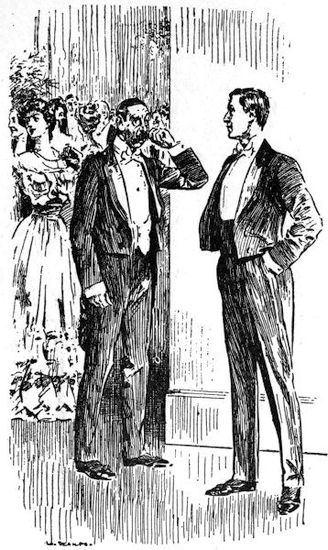
Prize Idiot (who doesn't know all the family). "Beastly slow here. I'm off. Which way do you go home?" Son of the House. "I'm there now."
Not so Bad as They Seem.—Mistresses show more consideration for their servants than is generally supposed. Not long ago Mrs. Fidgitt was heard telling Mary Ann that she had been scouring the whole house for her.
How We Arrange our Little Dinners.—
Mistress. "Oh, cook, we shall want dinner for four this evening. What do you think, besides the joint, of ox-tail-soup, lobster patés, and an entrée—say, beef?"
Cook. "Yes,'m—Fresh, or Austr——?"
Mistress. "Let's see? It's only the Browns—tinned will do!"
Motto for a Servants' Hall.—"They also serve who only stand and wait."—Milton.
"Cook's" Excursionist.—Her policeman on a trip.
Sweet Simplicity.—Visitor. "Jane, has your mistress got a boot-jack?"
Maid-of-all-work. "No, sir; please, sir, I clean all the boots, sir!"
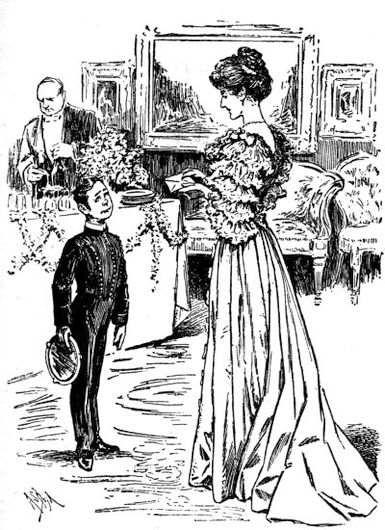
Before the Reception.—Lady of the House (instructing new page). "Have you ever been at a party before, Riggles?" Riggles. "Honly as a guest, mum."

Sympathetic.—Young Wife (rather nervously). "Oh, cook, I must really speak to you. Your master is always complaining. One day it is the soup, the second day it is the fish, the third day it is the joint—in fact, it is always something or other." Cook (with feeling). "Well, mum, I'm truly sorry for you. It must be quite hawful to live with a gentleman of that sort."
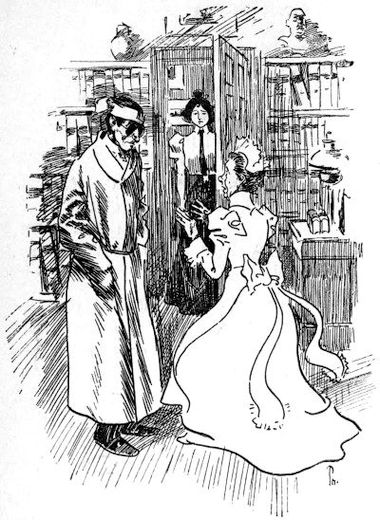
Mary (the new housemaid who visits the study for the first time, and is unaware that poor Snooks is suffering from a violent headache and has been ordered to keep a damp cloth round his head and wear goggles). "Lawk-a-mussy!" Mrs. Snooks (appearing at door). "What's the matter, Mary? It's only master!"
Everything Comes to the Man who Waits.—Country Rector's Wife (engaging manservant). And can you wait at dinner?
Man. Aw, yes, mum; I'm never that hoongry but I can wait till you've done.
Unconsciously Appropriate.—Jane. 'Allo, Hemma, what are yer a-crying about?
Hemma. Missus 'as given me the sack because I knocked over some of them hornaments she calls "break-a-break."
Gentleman (to Thomas, who has given notice). "Oh, certainly! You can go, of course; but, as you have been with me for nine years, I should like to know the reason?"
Thomas. "Why, sir, it's my feelins. You used always to read prayers, sir, yourself—and since Miss Wilkins has bin here, she bin a-reading of 'em. Now I can't bemean myself by sayin 'Amen' to a guv'ness."
The Force of Habit.—Our coachman, when he waits at table, always commits the same fault: he whips away the plates too soon.
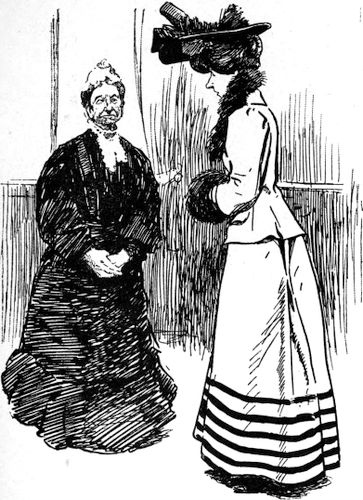
A Good Start.—New Maid Servant (just arrived). "May I harsk if my young man 'as called yet?"
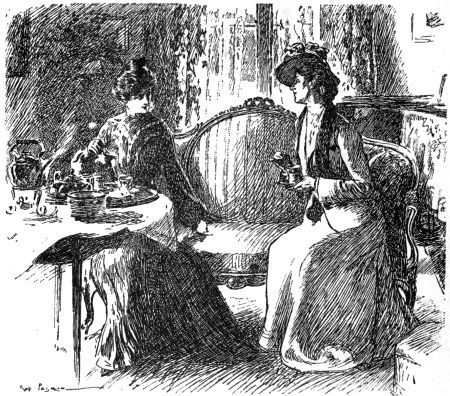
FEMININE AMENITIES
Mabel (not in her first youth). "First of all he held my hand and told my fortune; and then, Evie, he gazed into my face ever so long, and said he could read my thoughts! Wasn't that clever of him, dear?"
Evie. "Oh, I suppose he read between the lines, darling."
New Version.—It was the reflection of a thoughtful hall-porter that the self-denying man must be the man who says he is not at home when he is.
A Discharge without a Report.—A servant dismissed without a character.
Diagnosis.—"Is the rector better to-day, Jarvis?"—"No, sir; not any better, sir!"
"Has he got a locum tenens?"—"No, sir. Same old pain in the back!"
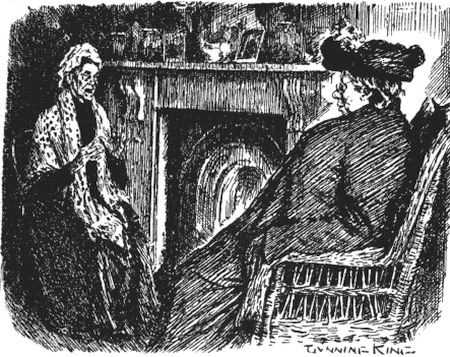
Hostess. "And do you really believe in christian science?"
Visitor. "Well, you see, I've been getting rather stouter lately, and it's such a comfort to know that I really have no body!"
BY A FASHIONABLE VALET.
The real essence of a gentleman is perfume.
You know the snob by his hands—the gentleman by his boots.
It is easier to pardon a hole in a person's manners than one in his coat.
In the noblest park there are mushrooms.
One grows rich, but one is born elegant.
With men, as with monuments, position is everything.
We make our money in London, but we spend it in Paris.
Society has but little faith, except in scandal.
Joke with an inferior, and you tumble to the level of that inferior.
There are many stylish men, but very few men of style.
Shopkeepers are the counters in the game of life. When we have no ready money, we are only too glad to use them.
A lady is an angel that ought never to touch the earth, excepting when she is stepping from the door to her carriage.

A Ju-Jitsuous Hint—Fair Victim. "Pardon, Mr. Snobbarts, this is a waltz, I believe, not a bout of ju-jitsu!"
Anything that reveals a compromise with one's pocket is inelegant, as for instance, Berlin gloves. In my opinion, naked-handed poverty is a thousand times preferable.
You can generally tell "a son of the soil" by the amount he carries in his nails.
England gives us meat, and France sends us cooks.
The gentleman is known at once by his walk, the lady by her carriage.
Credit is the homage that trade pays (and sometimes pays very dearly) to rank.
Not so Bad as Volodyovski.—Lady (to applicant for nursemaid's place). What is your name?
Applicant. Hermyntrude, mum.
Lady. Good heavens! That would never do. Can't you think of something shorter?
Applicant (after a pause). Well, mum, my young man allus calls me Carrots.
Simple Fractures.—Servants' breakages.
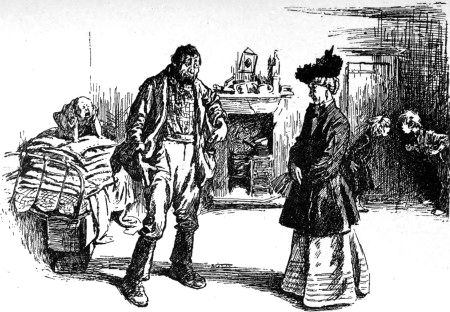
"Ah, mum; I'm a 'eap better in my 'eart since last time you come 'ere a-districk visitin'. It's all along o' thisher little book 'Hernest Words to the Young' as I pinched outside a bookshop wen the propperrieter was a-lookin' the other way. A power o' good it 'ave done me!"
The Beau Ideal of a Cook.—One who cooks a rabbit to a hare!
A Servant on Spiritualism.—It is fortunate that rapping spirits, which seem very tricksy beings, do not seem to be able to move street-knockers. Otherwise we should continually be going to answer a rap at the door, and coming back, saying, "Please'm only a ghost."
The Force of Habit.—Missus (who is acting as amanuensis to Mary). "Is there anything more you wish me to say, Mary?"
Mary. "No, marm, except just to say, please excuse bad writin' and spellin'."
A Triumph in Cookery.—When the cook makes a hash of the marrow-bones.
Mistress (to new maid). "Well, Mary, I've tried to apportion you different duties for each day in the week, so that you may have variety in your work. You've been here a month now. Just tell me which day you like best?"
Maid. "Please, mum, my day out"!
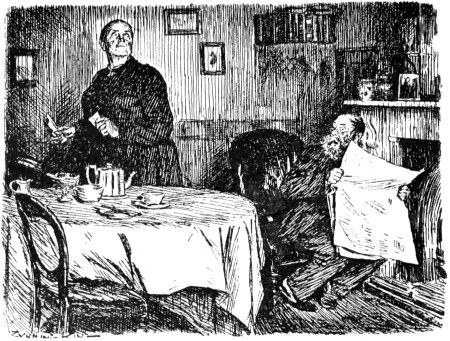
The Test of Courage.—She. "You men are such cowards." He. "Anyhow, one of us married you!"
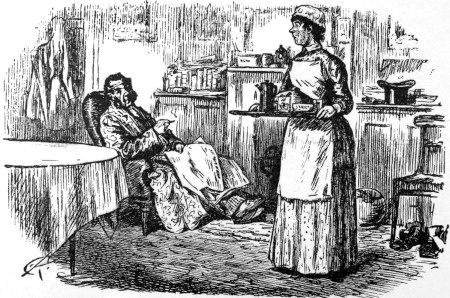
"Not Negotiable!"—Impecunious Lodger. "Jemima, did you ask Mrs. Maggles whether she would take my I. O. U. for this quarter's rent as I'm rather——" Maid of all Work. "Yes, sir, and she say she won't, sir, not if you was to hoffer 'er the 'ole halphabet!"
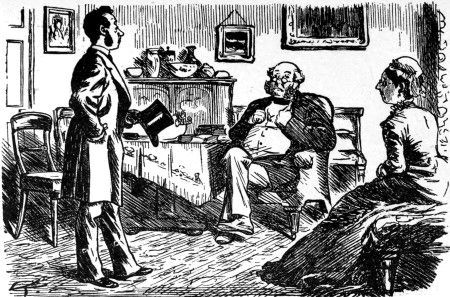
A Blank Page.—Sir Patrick. "Then, I presume you know a little about cleaning silver, waiting at table, and so on?" Jenkins. "Nothing whatever, sir. But I do not suppose there is anything which intellect may not overcome!!"
Seasonable.—A servant, to whom money is an object, during the present winter offers (unbeknown) to let out his master's study fire by the hour. For terms apply to the Pantry, Belgravia.
"Slightly Mixed."—Mistress (to maid, who has just received a month's notice). "I would rather not give you a character at all. But if you insist upon it, of course I shall tell the truth about you."
Maid. "And if you do, ma'am, I shall suttingly bring an action for defimation o' character!"
The Flunkey Millennium..—When every valet shall be exalted.
Inhabited House Duty.—The servants'. And I wish they'd do it.—Yours, paterfamilias.
Sancta Simplicitas.—Housemaid. "We're getting up a sweepstakes, Mrs. Thrupp. Won't you join?"
Housekeeper. "Gracious me, child; not I! Why if I won a horse I shouldn't know what to do with him!"
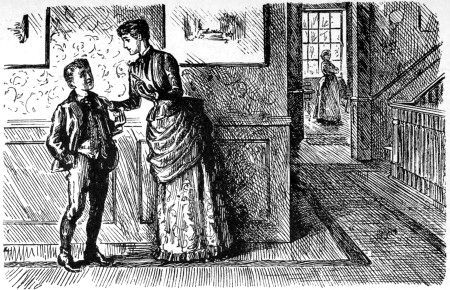
Early Domestic Trials.—Young Wife (in great trepidation—to her brother). "Tommy, I'm going to give the cook warning. Just listen at this corner, and as soon as you hear me say, 'Cook, I give you a month's warning from to-day,' mind you call me, and say I'm wanted immediately!"
We understand it is in contemplation to get up a club for the purpose of endeavouring to improve the quality of servants. The indifference of the material is very much against the project, but the effort is worth making. A few old housekeepers have determined to set the scheme on foot by offering a few prizes, of which the following is a catalogue:—
For the Cook who has lived longest in one place without including whole candles under the general head of kitchen-stuff
One pound
For the Nurse who has walked oftenest in the Park without speaking to a Horse-guard
Ten shillings
For the Housemaid who has remained longest in a situation in which the cat has not been in the habit of doing wilful damage to the crockery
Five shillings
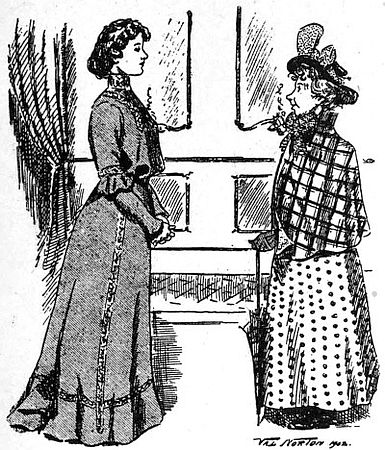
Lady (engaging a maid). "Was your last mistress satisfied with you?"
Maid. "Well, mum, she said she was very pleased when I left!"
For the Cook who has been the greatest number of years in service without resigning her own heart and her mistress's cold meat to the devouring passion of a policeman
Fifteen shillings
For the Nurse who has remained the longest time in a place without mistaking the children's linen for her own, and given the baby the fewest private punches and pinches
Seven shillings
For the Female Servant who has set off on Sunday evenings to go to church, and found her way there oftenest
Five shillings
For the Page who has opened the smallest number of notes in the longest period of service
Half-a-Crown
For the Groom who has best carried out the principles of protection with regard to his master's corn
Ten shillings
For the Footman who has worn the fewest of his master's shirts
One shilling
The above are only a few preliminary prizes, but if the scheme can be effectually carried out, there is every intention to offer rewards for a variety of other qualities. In the present day, when servants are always "bettering" themselves, which means growing worse and worse, the project of a prize club for this troublesome class seems fraught with the most promising prospects.
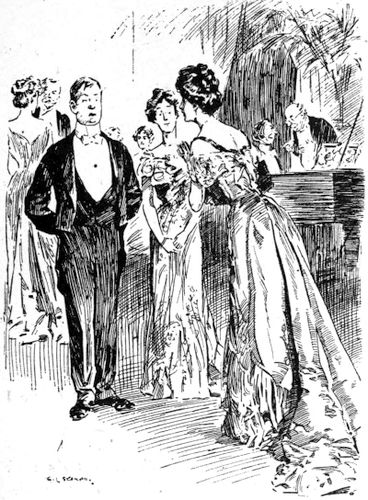
Speeding the Staying Guest.—Hostess. "Won't you sing something, Mr. Borely?" Mr. B. "Yes, if you like. I'll sing one just before I go." Hostess. "Well, do sing now, and perhaps Miss Slowboy will accompany you."
Mistress. "Did Mrs. Brown say anything when you told her I was out?"
Maid. "Yes, 'm. Mrs. Brown, mum, said, 'Thank Heaven!' mum."
Out of her Element.—The last place which you would expect a woman to like is—a stillroom.
"Cuisine."—Mistress. "Susan, we're thinking of having a pig's head boiled for dinner. You understand it, I suppose?"
Cook. "Oh no, m'um. I told you before I came I didn't understand game!"
"In the Queen's Name."—Martha the Cook (to Lizzy the Housemaid). "'Ere's an 'orrible mistake. In 'is subscripshion list the heditor 'as spelt your name with a "hi" and a "he" instead of a "y.""
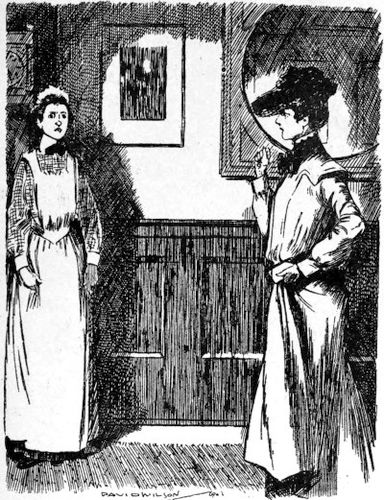
"A GHOSTLY VISITANT"
Mistress (returning). "Any one to see me, Mary?"
Mary. "Yes, mem. An insanitary spectre."
[But it was only the sanitary inspector who had called regarding some alterations that were going on.
Scene—Parlour of Private House, Oxford. Time—Quite recently. Cook wishes to speak to her Mistress.
Cook. Please, 'm, I should like to go out this evening, 'm, which it's to see them Frogs at the New Theayter.
Mistress. But it's all Greek, and you won't understand it.
Cook. O yes, 'm. I once saw the Performin' Fleas, and they was French, I believe, leastways a Frenchman were showin' of 'em, and I understood all as was necessary.
[After this, of course she obtains permission.
Domestic Economy.—Cook (to Vicar's Wife). "And what's to be done with the sole that was saved yesterday, ma'am?"
Bucolic Boot-boy. "I say, Sarah, wotever be a creematorium?"
Metropolitan Maid. "Oh, you are an ignorant boy! Why, it's French for a milkshop, of course!"
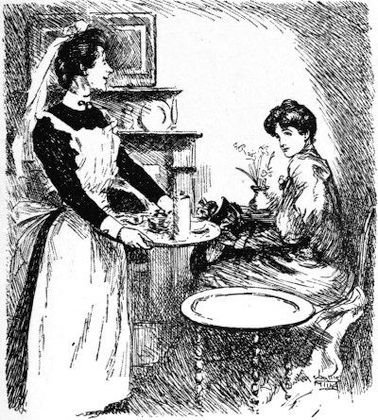
Mistress (soliloquizing). "I'm afraid this hat's rather out of date."
Maid. "Oh, no, mum. It's quite fashionable. Cook has just bought one exactly like it!"
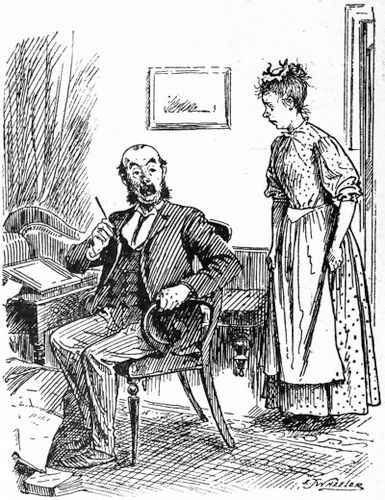
Domestic. "There's a gentleman wants to see yer on business." Master. "Well, ask him to take a chair." Domestic. "He's taking 'em all, and the table too. He comes from the furniture shop!"
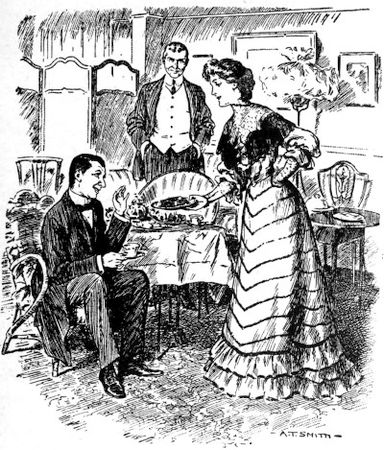
Foreigners are always so very polite.—Charming Hostess. "Do have some of my cake. I don't believe you've ever tasted my own make?" Delightful Foreigner (wishing to be polite). "Indeed—indeed I have, and I assure you I did not wish to eat anything else for days after!"
On this subject much nonsense has been written. They are quite as suitable (perhaps more so than otherwise) to the cottage as to the castle. The cottage need not have a name spelt with a Celtic series of dissonant consonants. A few hints may be advisable to the numerous "Lady Helps" at present in the market.
A Lady may efficiently help the mistress of the household to snub her husband, by adroitly echoing (and improving) the said mistress's remarks of a personal character.
A Lady may help the Cook to produce an original dinner, by suggesting fresh combinations, which will make the said Cook indignant, and even furious.
A Lady may help the Butler effectually, by decanting the '45 port, and shaking it a little first as you would Daffy's Elixir.
A Lady may help the visitors to the house by reading all the letters that may chance to be thrown aside, and taking advantage of any private intelligence they contain.
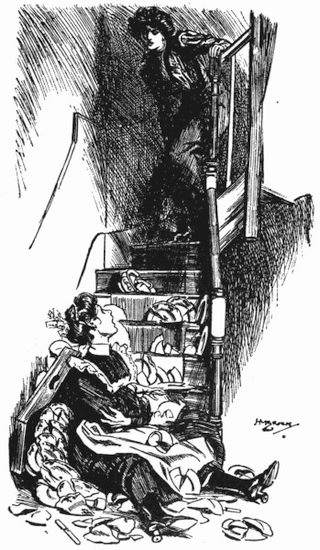
Mistress. "Oh, Gwendolen, whatever have you done!"
Gwendolen. "It's all right, m'm. I 'aven't 'urt myself!"
A Lady may help the master of the house by a flirtation in the library, while the mistress is away on a round of visits.
A Lady may help the daughters to quiet talks in the Park with ambitious Curates.
A Lady may possibly help the son and heir to—herself.
You see, there are ladies and ladies, as there are fagots et fagots, and Mr. Punch has his suspicions of the Lady Helps of the future.
Advice to Servants of All Work.—"Learn to labour and to wait."
Happy Thought.—Husband (devoted to spouse and bridge). What shall we christen the little dear?
Wife (still more devoted). I've been thinking—why not—Bridget?
Husband (delighted). By all means. For luck.
"Hard Lines."—Mistress (to former Cook). "Well, Eliza, what are you doing now?"
Ex-Cook. "Well, mum, as you wouldn't give me no character, I've been obliged to marry a soldier!"
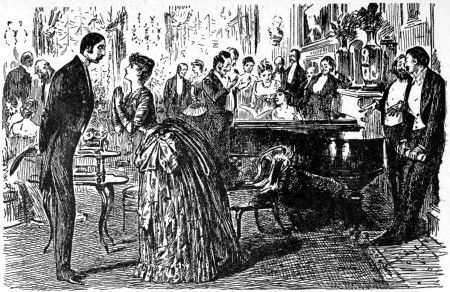
Things one would rather have left Unsaid.—Hostess (who has just sung). "Are you quite sure you don't sing, Captain Lovell?" Captain Lovell. "I assure you—a—I've no voice whatever. A—unfortunately, I—I'm a listener!"
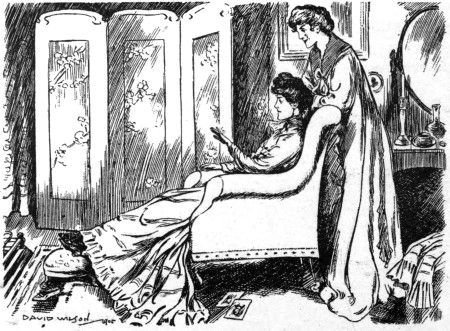
Intuition.—Ethel (to Mary, her bosom friend, who has been admiring the diamonds, and now hears for the hundredth time how it all came about). "I don't know exactly what it was; but somehow I felt, from the moment we met last night, that he meant to propose. Something about him—something in his voice——" Mary. "Ah, I see, there was the true ring in it!"
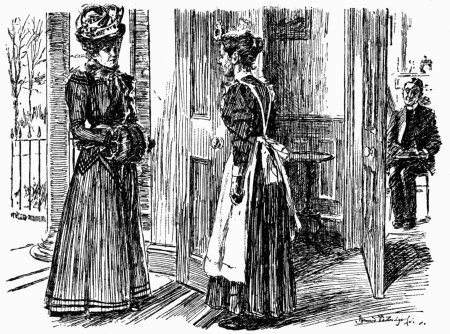
"Oh, please, 'm, th' noo paarson's called to see you."
"Very well, Mary. I hope you've shown him in, and asked him to sit down?"
"Oh, yes, 'm, ah've loosed 'im into the drawing-room!"
This Pink must be planted in the most aristocratic soil. The mould should be the very mould of form. It grows mostly in the open air, and Belgravia may be looked upon as the great nursery for these Pinks. Several favourable specimens, also, have been reared at the theatres, the Italian and French operas, and similar fashionable forcing houses. It is met with in great profusion at the balls of the nobility. The latter specimen, however, cannot bear the daylight. It is put into a hot bed the first thing when carried home in the morning, and there it remains closed up and almost dead until the evening, when it just begins to lift its drooping head. It is about twelve o'clock at night that it is seen to the most blooming advantage. Your Pink of Fashion is watered with a liquid called champagne, and, if it is at all faint, a little piece of chicken and ham, and a few crumbs of bread, applied to the mouth of the delicate flower, will revive it wonderfully. It is a very tender plant, though it has been known to bloom for two or[Pg 61] three seasons. The greatest care, however, is requisite to keep it from the cold, for its beauty is so sensitive, that the slightest neglect will nip it in the bud. The Pink is of several colours, but[Pg 62] the white with a beautiful maiden blush is the specimen the most preferred. This Pink usually carries its head very high, and, though not distinguished for any particular amount of scents, still it is eagerly taken in hand in society for its[Pg 63] (s)talk. The Pink of Fashion is mostly single, but cases of double Pinks have been recorded. The double (or married) Pink, however, does not excite one half the interest of the one that is single.
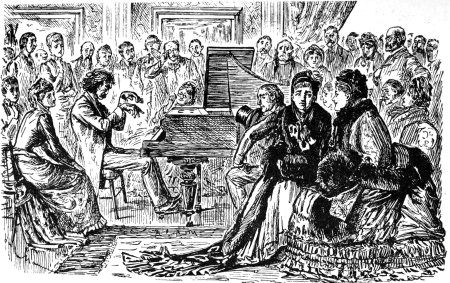
Music at Home.—Mrs. Smith (fortissimo, to Mrs. Brown, in one of those sudden and unexpected pauses with which Herr Signor Hammerantonga is fond of surprising his audience). "And so I gave her a month's warning on the spot!"
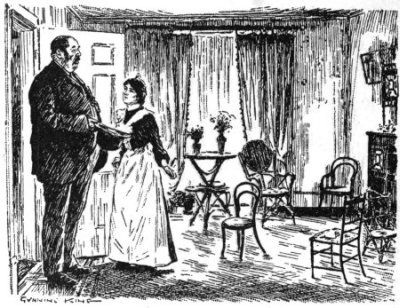
Farmer Twentystone, from Mudshire, visits his recently married niece at Lavender Villas, Brixton.
Housemaid. "Will you sit down, if you please, sir?"
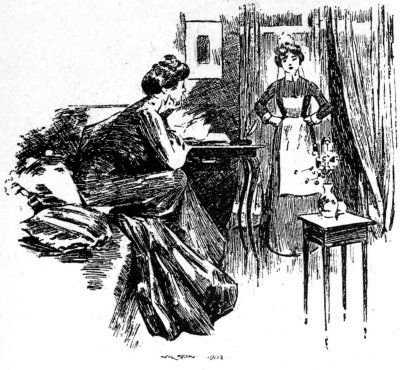
FEBRUARY 14
Mistress. "So you want me to read this love-letter to you?"
Maid. "If ye plaze, mam. And I've brought ye some cotton-wool ye can stuff in yer ears while ye rade it!"
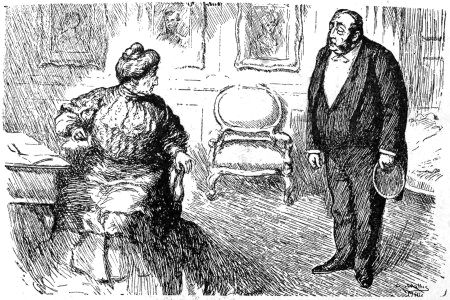
Her Ladyship (who has been away from home for Christmas). "Well, Blundell, I hope you all had an enjoyable Christmas dinner?" Blundell. "Yes, thank you, my lady. Ahem! I—er—took the liberty of obtaining—in the absence of your ladyship—the biggest goose procurable!"
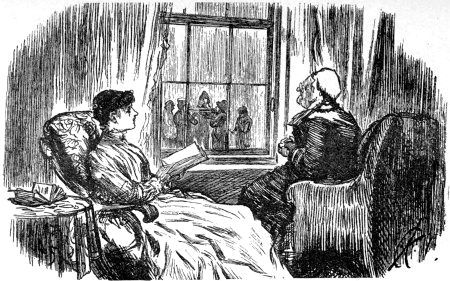
Brass.—Sympathetic Old Lady. "Oh dear, dear! I do so feel, Mabel, for that poor man with the long trumpet."—(She must mean the trombone in this street band.)—"All through the piece, dear, he's been trying to fix it right, and he can't do it, poor fellow!!"
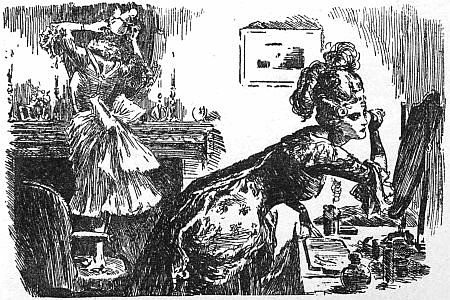
Sisters! (Before the ball.)—Pierrette (changing the subject after a recent tiff in which she has come off victorious). "This glass is better, Rose. I can see myself here beautifully!" Pompadour (seeing her opportunity). "Plainly, I suppose you mean."
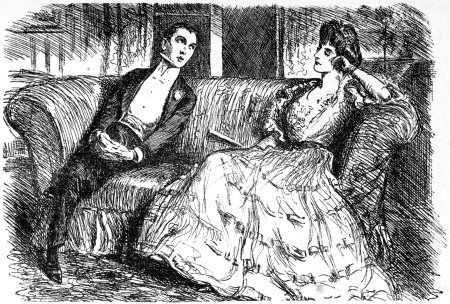
Sentimental Youth (to partner shaken by a passing tremor). "Oh, I hope you don't feel cold?" She. "Not at all, thanks. Only 'the grey goose walking over my grave.'" Sentimental Youth (with effusion). "Happy goose!"
Mr. Punch rejoices to hear that "the greatest plague of life" has a slight chance of being abated by the establishment of a College for Servants, who will be educated in the most careful way to do justice to their employers—the main idea being that most lucidly stated by the Dean of Saint Patrick's, that it is the chief duty of every servant to ascertain the full amount of his master's income, and to spend the whole of it on his own department. Having been favoured with an early copy of the subjects with which the courses will commence, Mr. Punch is glad to give to this useful undertaking the advantage of his worldwide publicity.
Class 1. Lady Housekeepers.—"How to manage a widower with young children. In three heads: 1, Domestication; 2, Flirtation; 3, Temptation."
Class 2. Cooks.—"How to make the kitchen-fire too hot for the missus, and too cool for the sirloin."
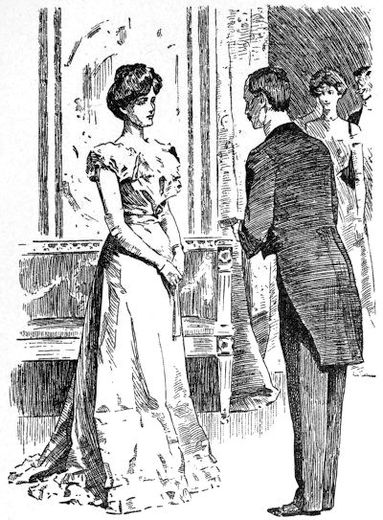
Son of the House. "Aren't you dancing this? May I have the pleasure? I'm trying to do my duty all round to-night!"
Class 3. Butlers.—"How to substitute Marsala for Madeira, and Vin ordinaire for Château-Lafitte."
Class 4. Lady's-Maids.—"How to look much prettier than the young ladies when there are visitors in the house."
Class 5. Footmen.—"How to make a fortune out of six feet two in height, and calves nineteen inches round."
Class 6. Men and Wives.—"How to keep their quarrels to themselves, and feed their 'incumbrances' in the neighbourhood."
Class 7. Coachmen and Grooms.—"How to make the corn supplied to the stables more useful than if wasted on dumb animals."
Class 8. Housemaids.—"How to train that noble animal, the harmless necessary cat, to break glass and snap up unconsidered trifles."
It can scarcely be doubted, from this preliminary syllabus of lectures, that the new Institution will do much for the comfort, economy, and refinement of our households.
"Chamber Music."—Baby!
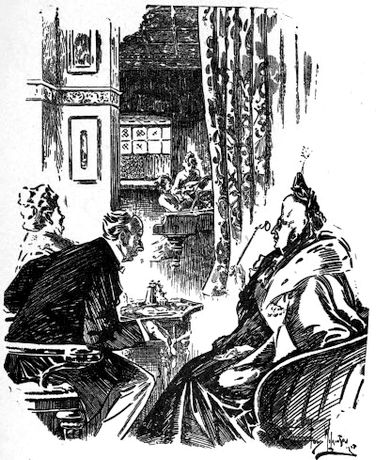
Lady Sneerwell. "Have your daughters accomplished much in music?" Unfortunate Father. "Yes—the tenants below have moved."
Question. Do you agree with a certain female lecturer, that it is the duty of the fair sex to captivate the other?
Answer. Certainly, as cleverness need not be divorced from fascination.
Q. You do not object, then, to brains in the abstract?
A. No; but as some men have a horror of the blue-stocking, I would cover fine heads with pretty toques.
Q. And if a woman has literary tastes, what would you advise?
A. That part of her reading should be devoted to the fashion journals, and she should not sacrifice her toilette to her intellect.
Q. What is your opinion about latchkeys, visits to the music-halls, and cigarettes?
A. That, from a man's point of view, they are played out, and consequently should be abandoned by man's would-be help-mate.
Q. What do you think of glasses?
A. That, when necessary, they should take the shape of a pince-nez, as it is more becoming than spectacles.
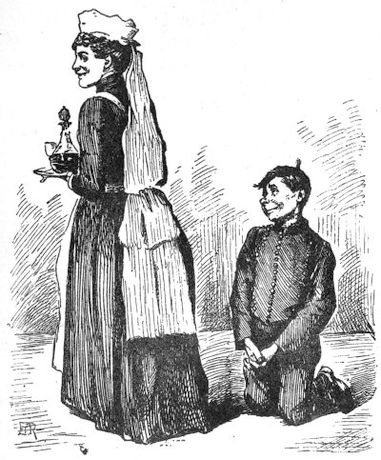
"INFLAMMABLE BUTTONS." UN PAGE D'AMOUR
Q. Then, before marriage, what should be your treatment of man?
A. I should do all I can in my power to please him.
Q. And after the nuptial knot had been tied, what then?
A. That, as Mr. Rudyard Kipling would observe, is quite another story.
NEW RULES FOR "PIT"
[On the authority of the Athenæum Club]
(1) The table shall be firmly clamped to the ground, and the cards shall be of metal not less than ¼ inch thick, with rounded corners.
(2) Any player who speaks in such an audible voice that the position of the roof is altered shall be forced to make the damage good.
(3) No player shall use a megaphone or speaking-trumpet of any kind.
(4) Muffin-bells may only be employed by players who have formed a "corner," and desire to communicate this fact to other players.

"The Earthly Paradise."—"What reason did he give for wishing to break off the engagement so soon?" "He said the report that he was engaged to me had not extended his credit nearly as much as he had hoped for."
(5) If a player has called "corner," and is found to have only eight similar cards in his hand, the game shall be continued without him. His remains may be removed at leisure.
(6) "Progressive Pit" with more than four tables shall only be played in a house which is at least five miles in any direction from other inhabited buildings.
(7) No person who is not a player shall approach while a game is in progress, except in the case when a player faints across the table and so obstructs the play.
SPRING CLEANING
[Scene—Spring Gardens. Enter Algy, L.H., meeting Frankie as he strolls in, R.H.]
Algy. Hallo, old boy! (Greeting) I've just had my house papered and painted inside and out.
Frankie. Indeed! And—er—(struck by the novelty) what sort of paper did you have put outside?
[Exit Algy, R.H., and Frankie, L.H. Scene closes.
Answer to Mary Anne.—The needle-gun is not threaded with gun-cotton.
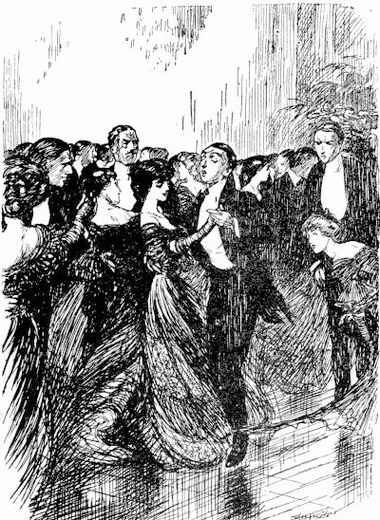
She (to clumsy steerer). "Rather like progressive bridge, isn't it?" He. "Why?" She. "Well, you see, you run up against everyone in the room before you've done."
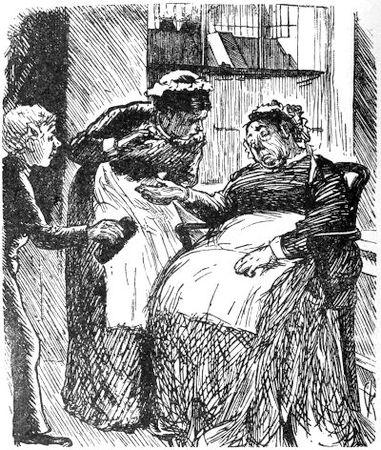
ROMANCE OF THE KITCHEN
Cook (from the area). "O, 'Liza, gi' me my winigrette—I've 'ad a—offer—from the dustman!!"
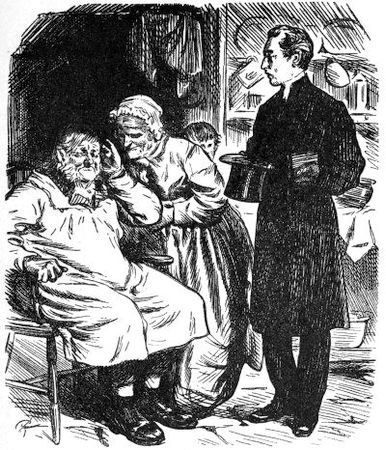
THE CONVALESCENT
New Curate (tenderly). "My good man, what induced you to send for me?"
Oldest Inhabitant. "What does he say, Betty?"
Betty. "Says what the deuce did you send for him, for!!"
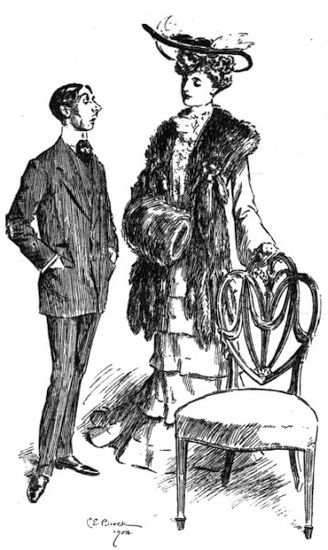
The Merest Accident.—She. "So you failed in your vivâ voce exam.?" He. "Yes; but it was purely from absence of mind."
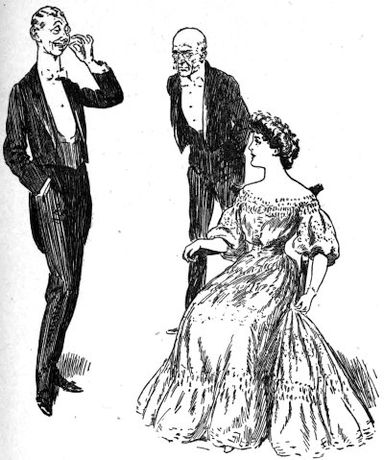
"O NOBLE FOOL! O WORTHY FOOL!"
Uncle (to nephew, who has just come into a fortune). "You must remember, my boy, that 'a fool and his money are soon parted'!"
Fair Cousin. "Oh, but I'm sure Sammy will be the exception that proves the rule!"
[Sammy is delighted.
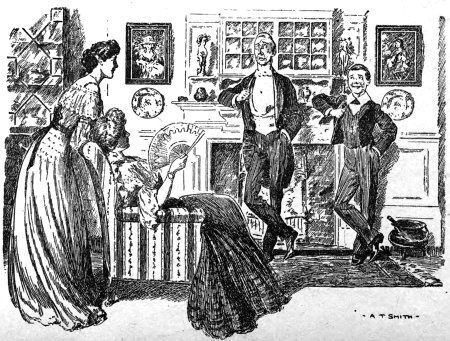
Pernicious Praise.—Mr. Ranty Snobbarts (holding forth). "By Jove, I'm awfully keen on huntin'. Ain't you, what?" Horrid Boy. "Yes, by Jove, he is keen. Why, when he wasn't huntin' the fox, he was huntin' his horse!"
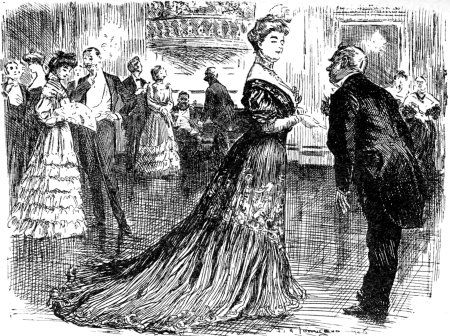
Duty First.—Her Ladyship (who is giving a servants' ball—to butler). "We shall begin with a square dance, and I shall want you, Wilkins, to be my partner." Wilkins. "Certainly my lady; and afterwards I presoom we may dance with 'oom we like?"
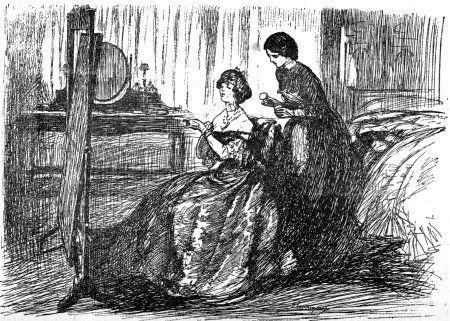
Maid. "There's a much better tone in this house now, m'm, than there used to be." Lady (indignantly). "Indeed! I don't understand you Chalmers." Maid. "Oh, m'm, I mean downstairs, of course. Not upstairs."
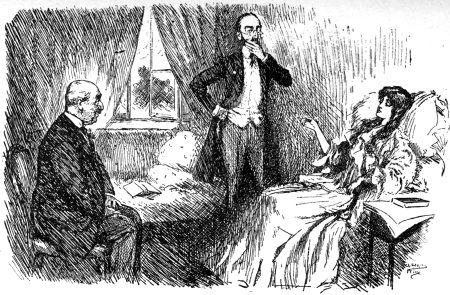
Things that might have been Expressed Differently.—Uncle George. "So glad you are so much better, Amy, my dear." Amy. "Yes, thank you, Uncle George. Since Dr. Pillum took me in hand my recovery has been simply miraculous!"
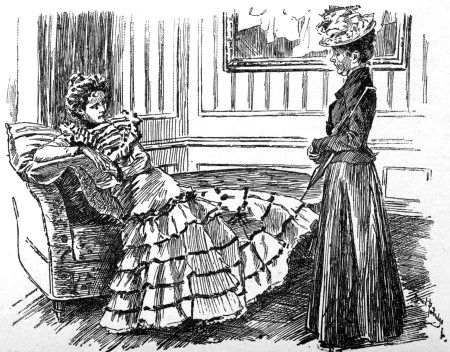
Applicant (for situation as parlour-maid). "Should I be expected to hand things at lunch, madam, or do you stretch?"
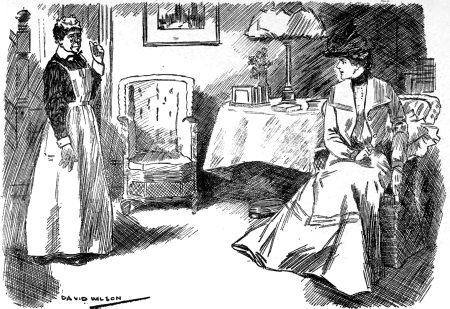
Lady Caller (to old family servant). "Well, Bridget, did Master Arthur shoot any tigers in India?"
Bridget. "Of coorse he did. Shure we have the horns of the craythurs hung in the hall!"
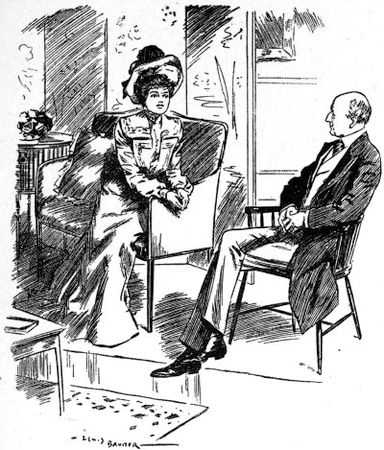
Smithson (the celebrated poet, novelist, playwright, &c.). "But, my dear young lady, I really don't understand you. I haven't been winning any ping-pong tournament. I don't play."
Miss Brown. "Oh, but surely I heard our hostess say you were 'the Mr. Smithson!'"
PRELIMINARY CHAPTER
Betty, "first catch your fish," is a golden rule for a cook, and first catch your situation is a very necessary piece of advice to be given to servants in general. The choice of a mistress requires as much judgment as the choice of poultry; and you should be careful not to pick out a very old bird in either case. The best market to go to in order to suit yourself is a servants' bazaar—as it is called—where mistresses are always on view for servants to select from. On being shown up to a lady, you should always act and talk as if you were hiring her, instead of wanting to be hired. You should examine her closely as to the company she keeps, and the number of her family; when, if there is any insuperable objection—such as the absence of a footman, a stipulation against perquisites, a total prohibition of a grease-pot, or a denial of the right of visit, by a refusal to allow followers—in either or all of these cases, it will be[Pg 89] as well to tell "the lady" plainly that you must decline her situation. It is a good general rule to be the first to give a refusal, and, when you find you are not likely to suit the place, a bold assertion that the place will not suit you, prevents any compromise of your dignity. If you like the appearance and manner of the party requiring your assistance, but with some few concessions to be made, the best way to obtain them will be by declaring that you never heard of any "lady" requiring—whatever it may be that you have set your face against. By laying a stress on the word "lady," you show your knowledge of the habits[Pg 90] of the superior classes; and as the person hiring you will probably wish to imitate their ways, she will perhaps take your hint as to what a "lady" ought to do, and dispense with conditions, which, on your authority, are pronounced unlady-like. If a situation seems really desirable, you should evince a willingness, and profess an ability, to do anything, and everything. If you get the place, and are ever called upon to fulfil your promises, it is easy to say you did not exactly understand you would be expected to do this, or that; and as people generally dislike changing, you will, most probably, be able to retain your place.
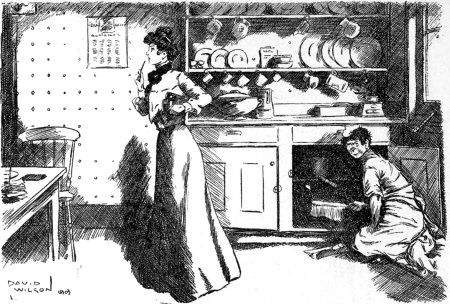
A Hint.—Young Housewife (as the front door bell rings). "Now, is that the butcher's boy—or a visitor?" New "General" (after a pause). "If you don't think you're tidy enough, mum—I'll go!"
When asked if you are fond of children, you should not be content with saying simply "yes," but you should indulge in a sort of involuntary, "Bless their little hearts!" which has the double advantage of appearing to mean everything, while it really pledges you to nothing. Never stick out for followers, if they are objected to; though you may ask permission for a cousin to come and see you; and as you do not say which cousin, provided only one comes at a time, you may have half-a-dozen to visit you. Besides, if the worst comes to the worst, and you cannot do any better, there is always the police to fall back upon. By-the-way, as the police cannot be in every kitchen at once, it might answer the purpose of the female servants throughout London, to establish police sweeps, on the principle of the Derby lotteries, or the Art-Union. Each subscriber might draw a number, and if the number happened to be that of the policeman on duty, she would be entitled to him as a beau, during a specified period.
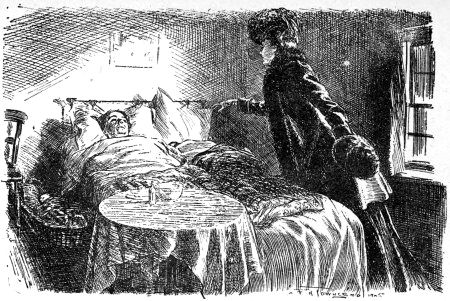
Visitor. "I'm so glad to find you going on so nicely, Mrs. Jenkins! And is this the dear little soul? I would so love to see him!" Mrs. Jenkins. "Lor, no, mum! That's my 'usband taking his bit o' rest. He's a policeman on night duty." [Quick exit, with promise to look in again.
Always stipulate for beer-money, and propose it less for your own advantage than as a measure of economy to your mistress, urging that when there is beer in the house it is very likely to get wasted. You will, of course, have the milk in your eye, when proposing this arrangement.
Tea and sugar must not be much insisted on, for they are now seldom given, but this does not prevent them from being very frequently taken.
Having said thus much by way of preliminary advice, we commence our guides to service with
THE MAID-OF-ALL-WORK
On arriving in your new place you get from the servant who is going away the character of your new mistress. She has already had yours, and you have a right to know hers, which, as it is given by a domestic who is most probably discharged, will, of course, be a very bad one.
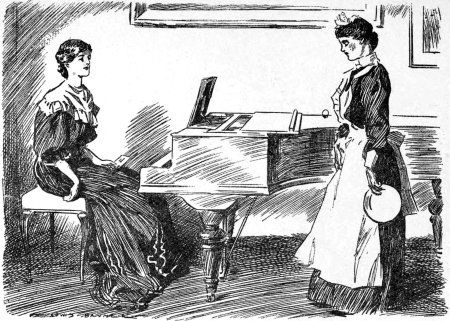
Mistress. "You wish me to take your notice,
Jane. This is very sudden, isn't it?"
Jane (blushing). "Oh no, mum,
I've known 'im three days!"
When your predecessor has taken her departure, your mistress may, perhaps, come into the kitchen and tell you what you will have to do, or, at least, a part of it. She will show you the bells, and tell[Pg 95] you which is the house bell, which the parlour bell, which the drawing-room bell, and which are the bells of the different bed-rooms;[Pg 96] but she will not tell you how you are to answer them when they are all ringing at once, which may occasionally happen. As it will probably be late when you arrive, you will have to carry up the tray for supper, when you will be stared at, and scrutinised as the new servant, by the whole of the family. Let us now look at your wardrobe. Two of each article will be enough, for if the washing is done once a week you have a change; but if only once in three weeks, you must contrive to supply yourself with the smaller articles, such as stockings and pocket handkerchiefs, from the family stock of linen.
As a maid-of-all-work, you have the great advantage of being a good deal alone, and can therefore indulge in the pleasures of philosophy. You can light the fires, and think of Hobbes. Fasten the hall-door, and recollect some passage in Locke. Or broil the ham for breakfast while wrapped up in Bacon.
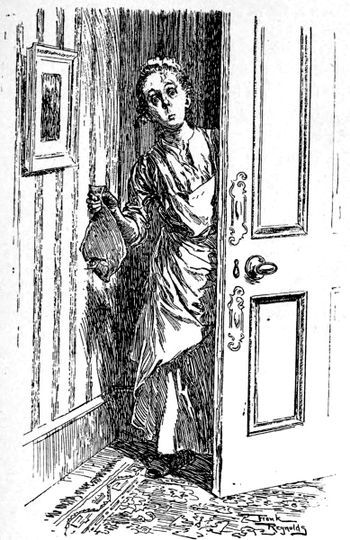
"Merely Mary Ann" Again.—"Please, 'm, the fishmonger says will you have it filtered?"
You should rise early if you can, but if you cannot you must make up for it by hurrying over your work as quickly as possible. As warm water will be wanted upstairs, don't stop to light the[Pg 97] wood, and set them all burning at once, when you will have some hot water immediately. Run into[Pg 98] kitchen fire, but throw on two or three bundles of the parlour and open the shutters, light the fire, cut the bread and butter, clean the shoes, make the toast; and when this is on the table, devote any time you may have to spare to sweeping the carpet.
Now, the family having gone down to breakfast, you may light the kitchen fire, and then run up and make the beds. After which you may sit down to your own breakfast, having previously, of course, taken the opportunity of helping yourself to tea and sugar from the tea-caddy.
You may now go upstairs, professedly to sweep the bedrooms, but really to look out of window, and if the street is a narrow one, talk to the servant opposite. Besides, looking out of window saves time, for you are able to answer the fifty people who come to the door in the course of the morning with hair-brooms, apples, carpets and rugs, tapes and stay-laces.
Being in a new place, you will be naturally curious to examine all the cupboards and drawers[Pg 99] up-stairs, but do not be too inquisitive at first, for you will have other opportunities for a good[Pg 100] rummage.
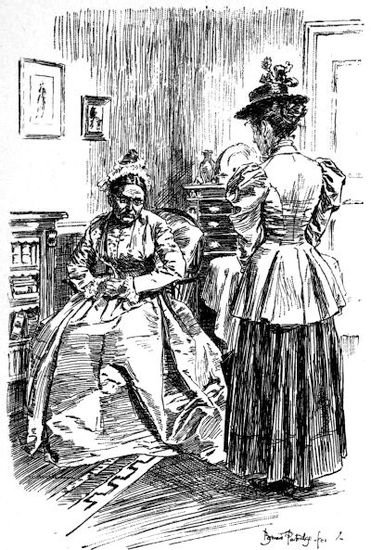
Lady (engaging servant). "I ought to tell you that we are all strict teetotalers here. I suppose you won't mind that?" Mary Jane. "Oh, no, mum. I've been in a reformed drunkard's family before!"
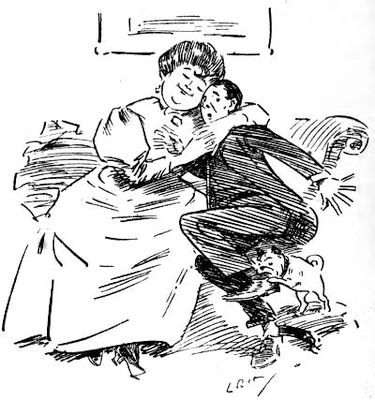
SIMPLE SAYINGS FOR THE SILLY
Bad as it is to be fawned upon, it is better than to be bitten.
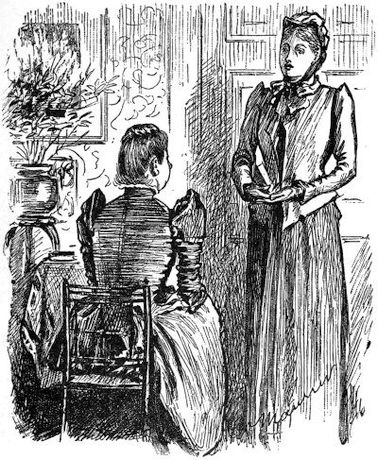
SANCTA SIMPLICITAS
Orthodox Old Maid. "But, Rebecca, is your place of worship consecrated?"
Domestic (lately received into the Plymouth Brotherhood). "Oh no, miss—it's galvanised iron!"
You will now come down to cook the dinner; but, as this is another branch of service, we proceed to tell you how to lay the table. Lay the knives and forks, taking the latter from the plate-basket, where they will be kept, though they are probably only Britannia metal or German silver; nevertheless, call it "the plate," as it will gratify your mistress.
If the family should be addicted to display, without means, you will have to set round doyleys and wine-glasses, with a decanter containing a remnant of British wine, which will not be touched, but will be brought on "for the look of the thing" every day after dinner. The time has now arrived for your own meal, and make the most of it. Secure all the tit-bits, and if you cannot manage to get through the whole of them at dinner, put away part of them for supper.
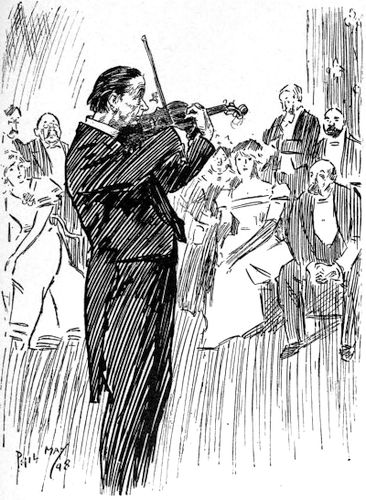
Disadvantages of Performing at a Country House in the Wasp Season. (Just in the most important passage too.)
About this time the afternoon's milk will arrive, and if you have beer-money you will take some of the milk out for your own use, taking care to fill up with warm water, so that you do not cheat your mistress of her quantity. You will be in the middle of washing up your dishes, when the family will want tea, and you will have just sat[Pg 103] down to your own tea, when you will probably be asked to do some mending. The best way to put a stop to this is to turn sulky, do the work badly, or express the greatest surprise, declaring that all the[Pg 104] time you have been out to service you never, &c., and would be glad to know who on earth, &c., &c., &c.
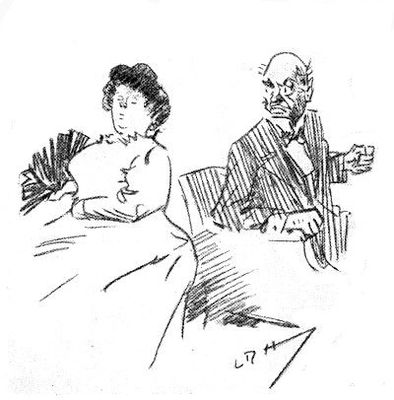
"I wish, madam, you would not interrupt me every time I try to say something. Do I ever break in when you're talking?"
"No, you brute, you go to sleep!"
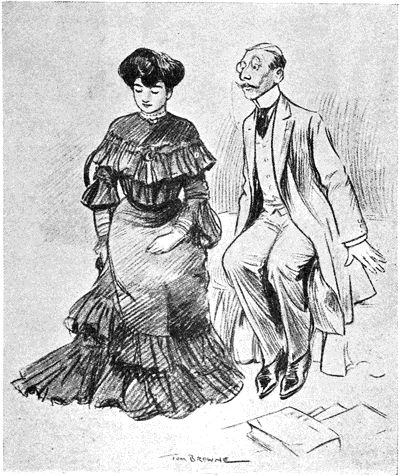
TO KEEP HIS MEMORY GREEN
He. "I was an intimate friend of your late husband. Can't you give me something to remember him by?"
She (shyly). "How would I do?"
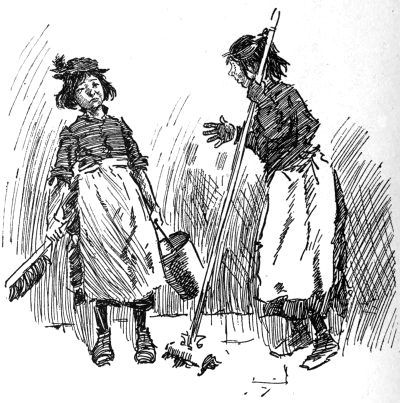
THE SERVANT QUESTION
"Oh, I say, 'ave you seen the papers about 'shall we do without servants?' I should like to see 'em try, that's all!" "Yus, and me too!"
You must not forget to cultivate your mind, and for this purpose you had better take in "Brainy Bits," and if you read it through every week, your head at the end of the year will be full of[Pg 107] volcanic rocks, the solar system, primary strata, electric eels, organic remains, and hints for preserving[Pg 108] gooseberries.
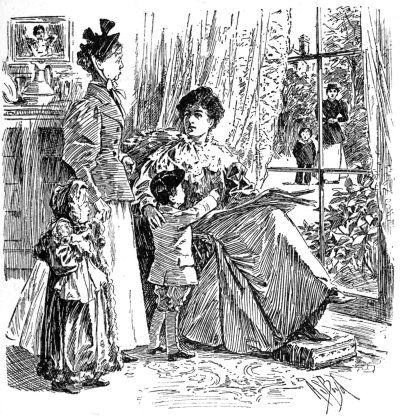
A CUT BENEATH HER
Lady of the House. "Oh, yes, Jane, I asked Mrs. Johnston to let her little boy and his nurse call to go walking with you and the children." Nurse. "Well, ma'am, I hope as you don't expect me to go walking with that young person? I don't think you can be aware as she is only a nurse-'ousemaid!"
On washing days there will probably be a woman come to wash; and in the mutual confidence of the tub, you will probably become very friendly. You may, no doubt, be of great service to each other, you in giving her bits of this and that, while she may serve you by becoming the agent for the disposal of your kitchen-stuff.
Do not fall a victim to low spirits, and above all, avoid sentiment. A morbid-minded maid-of-all-work, whose heart has been carried off in the butcher's tray, the milkman's can, or the baker's basket, is for ever lost. Never hang your affections on a policeman's staff. The force is proverbially fickle, and many a servant girl has pined with a hopeless passion for one who has moved in a superior station.
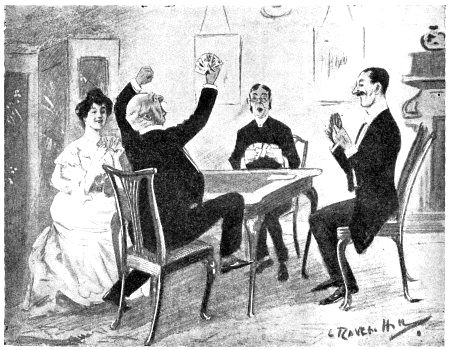
Bridge Problems.—No. 1.—What has the dealer declared?
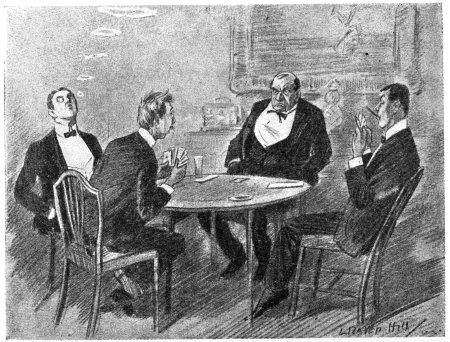
Bridge Problems.—No. 2.—Will dummy go spades?
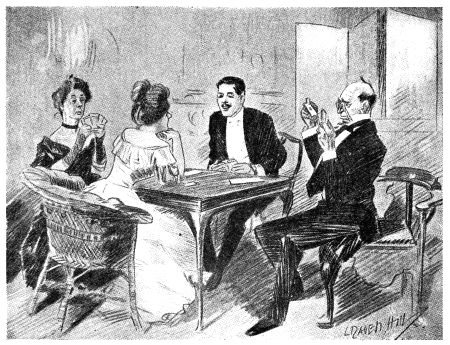
Bridge Problems.—No. 3.—Why did she declare hearts?
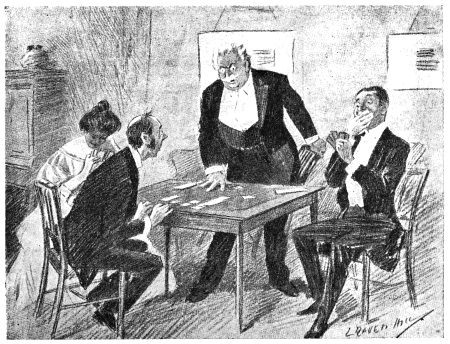
Bridge Problems.—No. 4.—What has dummy declared?
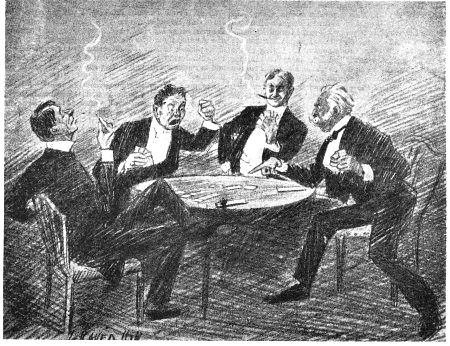
Bridge Problems.—No. 5.—Who doubled no trumps?
One of the most trying situations for a maid-of-all-work, is in a house where there are lodgers. She will, very likely, have to take everything at once to everybody at once. She will be having the first floor and the two-pair back clamouring at the same time for the only tea-pot in the house, while the parlour will be calling angrily for his boots, which have been taken by mistake, to the garret, who is writhing in intense agony for his highlows.
THE COOK
For ages it has been believed that a certain wicked person sends cooks; but Johnson has well observed, and so by the by have Smith and Brown, that "if we had no cooks, we should be as bad as cannibals."
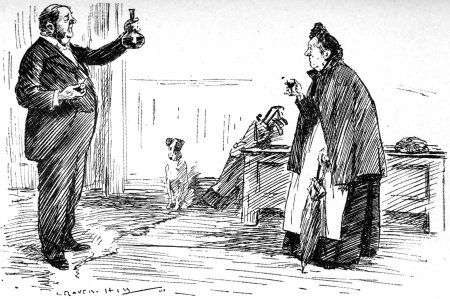
Butler.—"Master says you're to have a glass o' this before you go, Mrs. Giles. Now, that's some rare good stuff, that is, an' will do 'ee a world o' good!"
Mrs. Giles.—"Well, it certainly do taste better than the physic I be in the 'abit o' takin'!"
Cooks have always been the subject of sarcasm, and Jones tells us that even in his day the wits loved to give the cooks a good roasting. It is said, moreover, that "too many cooks will spoil the broth," from which we may presume that, as the workhouse broth is the very worst in the world, a great many cooks must have a hand in it. Apicius was the first man who made cookery a science, and he poisoned himself: no doubt with his own cookery. He invented several sauces, and was, in fact, the Roman Harvey. He is believed to have been the first who added the[Pg 115] trimmings to legs of mutton, and he took for his motto the line in Virgil:—[Pg 116]
"At Regina gravi jamdudum saucia curâ."
because the luxury of gravy, jam, sauce and curry are all shadowed forth in the quotation alluded to.
Dr. Johnson was, according to Boswell, "a man of very nice discrimination in the science of cookery," and he was proverbial for his sauce, which he dealt out to every one with the greatest freedom. Boswell once asked him if he liked pickles, when he said, "No, sir; the man who would eat a pickle would pick a pocket."
Boswell adds, "I ventured to say he would"; and they wound up the evening with grog, which Boswell, as usual, had to pay for; and it is thought that the expression of "Standing Sam" originated with Boswell having to stand whatever Sam (Johnson) chose to call for.
The celebrated Dr. Parr was also a great epicure, and liked his victuals underdone, from which we have the expression Parr-boiling. Milton loved his meat well dressed, and died with a good thing in his mouth; but whether it was a[Pg 117] morsel of philosophy, or something nice, has never transpired.[Pg 118]
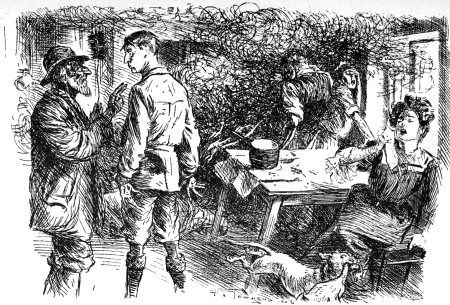
A Dead Cert.—Expert from the Estate (just arrived—the gardener being a distinct failure). "Why, would you believe it, sir, I thoroughly cleaned your stove yesterday just before you came—took it all to pieces—and" (most cheerfully) "I'll lay a sovereign I put some of it back wrong!"
Having said thus much of the ancient and classical who took an interest in cookery, we plunge down stairs into the modern kitchen, and embrace the cook of the present period.
On going to be hired, you will, perhaps, be told there are no perquisites allowed. Don't stick out about that, for if perquisites are not allowed you must take them.
It is easy to say the meat makes no dripping, and, of course, you can't account for it.
It is a rule in cookery to make the best and the most of everything, and you will therefore sell your kitchen-stuff at the marine-store shop that will give the best price for it.
In some families the mistress of the house will assist the cook; but she should have a sickener of that as soon as possible. If she makes a pie, spoil it in the baking; for if there is any truth in the adage about "too many cooks," the lady of the house should not be encouraged in making one of the number.
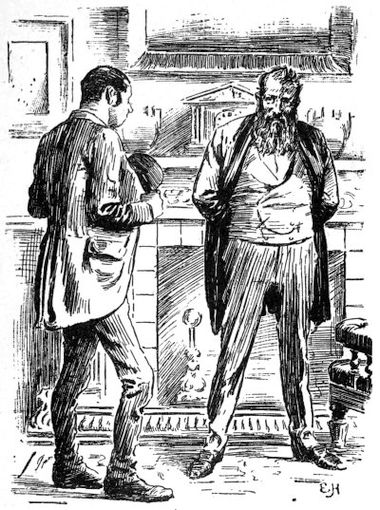
ONE THING AT A TIME
Genial Master (under the painful necessity of discharging his coachman). "I'm afraid, Simmons, we must part. The fact is, I couldn't help noticing that several times during the last month you have been—sober; and I don't believe a man can attend properly to the drink if he has driving to do!"
Order is a great essential to a cook, who should[Pg 119] keep everything in its place, taking care to keep herself as snugly in her place as possible. Never connive at dishonesty in others, but keep yourself to yourself; for, if you rob your mistress, the least return you can make is not to sanction others in[Pg 120] doing so.
Never go into any place where a cat is not kept. This useful domestic animal is the true servants' friend, accounting for the disappearance of tit-bits, lumps of butter, and other odd matters, as well as being the author of all mysterious breakages. What the safety-valve is to the steam-engine, the cat is to the kitchen, preventing all explosions or blowings up that might otherwise occur in the best regulated families.
Having laid down some general principles for the guidance of cooks, we give a few maxims that cannot be too strictly attended to.
1. Keep yourself clean and tidy if you can. If your fingers are greasy wipe them on your hair, which thus acquires a polish.
2. When a joint comes down from dinner, cut off what you intend for your supper. If cut while the joint is warm, it does not show that it has[Pg 121] been cut. Relieve it also from all superfluous fat, which will of course go into your grease-pot.[Pg 122]
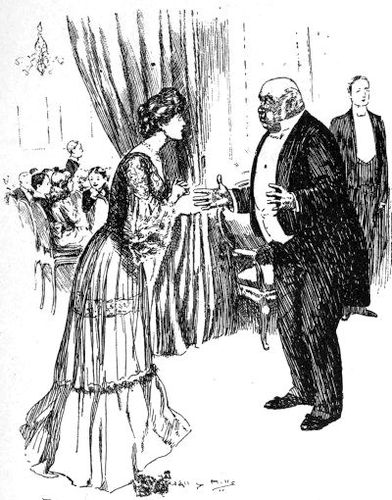
A Warm Welcome.—Distracted Hostess (to Uncle George, who has arrived unexpectedly). "Oh, I'm so glad you have come! The conjuror I had engaged hasn't turned up. So you'll do some tricks to amuse the children, won't you?"
3. If you want a jelly-bag, cut up an ironing blanket for the purpose. The former is of course wanted in a hurry, but the latter may be procured at leisure.
4. When your dishes come down stairs, throw them all into scalding water at once. Those that are not broken by the operation may afterwards be taken out, and put in their proper places.
5. Scour your pickle-jars, but empty them first, if you are fond of pickle.
6. If you have been peeling onions, cut bread-and-butter with the same knife; it will show the multifariousness of your occupations, and perhaps give a hint for raising your wages.
7. Let your spit and your skewers be always rusty; or, at least, do not take the trouble to polish them; for by leaving great black holes in the meat, they show it has been roasted, which is always better than being baked, and it will be the more relished in consequence.
8. Never do anything by halves, except lamb, which you must sometimes do by quarters.
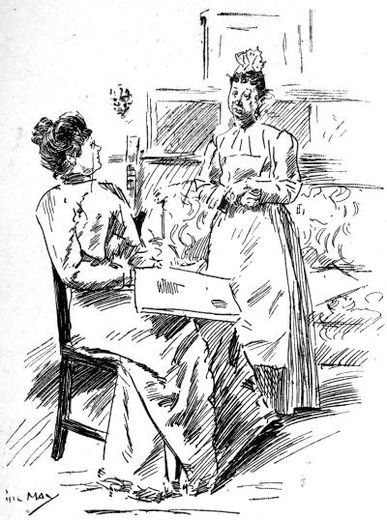
Indirect Oration.—"Oh, if you please, mum, there's no meat for dinner. The butcher 'as been and gone and never come this morning!"
9. If you are cooking even a sheep's head or a bullock's heart, take pains with them, so that what you do may be equally creditable to your head and heart.
10. If you have a follower, or a policeman, who likes a snack, cut it off each joint before you cook it—for everything loses in the cooking—and the disappearance of one pound, at least, in eight or nine, may thus be easily accounted for.
The above maxims will be sufficient to guide the cook in her course of service, and we do not add any receipts, for it has been well said by Dr. Kitchener, or might have been said by him as well as by anyone else—that he who gives a receipt for making a stew, may himself make a sad hash of it.
In bidding farewell to the cook, we would have her remember that her control over the safe will give her a peculiar influence over the hearts of the police, and she must be careful not to enervate a whole division, and leave a district defenceless, by being too lavish with the blandishments of love and the larder.
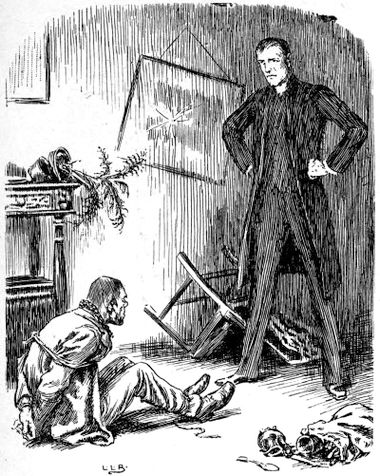
Scene—Country Vicarage.
Burglar (who has been secured by athletic vicar after long and severe struggle). "I think you're treatin' me very crool—and a clergyman too!"
THE LADY'S-MAID
Ladies'-maids are the rarest articles of female domestic service, and being in the nature of luxuries, are the best paid. They are to cooks and housemaids what the pine-apple is to the pomme de terre, and for this pine-like superiority of station many are doomed to pine in vain. The statistics of female service give us a million maids as the grand total, and deducting three-eighths for servants-of-all-work, two-eighths for cooks, three-sixteenths for housemaids, and one-eighth for nurses, we have a surplus of one-sixteenth for ladies'-maids, which will be about a fair average.
Servants belonging to this superior class should be able to read and write. It is a good practice in the former accomplishment to read all the notes sent to your mistress, and the little motto wafers, now in use, seem invented to facilitate this arrangement, for they never adhere to the envelope.
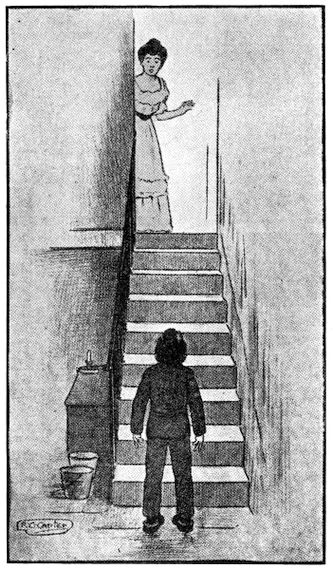
Bridge Below Stairs.—"Good gracious, James, whatever is the meaning of this extraordinary hilarity in the kitchen?"
"Cook's just revoked for the third time, marm!"
You will probably have the charge of your mistress's apartments. Never suffer anything to lie about, and, therefore, you should pocket any trifle[Pg 128] that is left carelessly out of its place. I do not mean to say you should become a thief, for, if found out, you would lose your place, and your character, but you must take care of a thing till it is missed, and when it is wanted, it will, of course be asked for. It is then time enough for you to find it in some hole or corner, into which it has of course got by accident. Your lady's dressing-box will be under your care. See that the scent-bottles are always well supplied, which you can only ascertain by taking a little out of them for your own use very frequently.
You should endeavour at all times to save your mistress trouble by acting for her as much as you can; and in order to do this effectually, you should dress as much like her as possible. Order about other servants just as she would herself, and talk to tradespeople exactly as if they were being spoken to by your mistress, of whom you are the representative. Of course the closer the representation you give of her, the more exact are you in the performance of your duty.
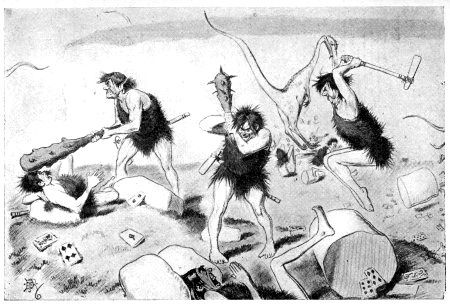
"Grand Slam" in the Stone Age.—It is, for obvious reasons, undeniable that a great wave of "Progressive Bridge" passed over the entire human race at a remote period. It is no use blinking the fact that while it lasted it was responsible for a marked "set-back" in the census returns.
Some ladies'-maids are expected to mend their ladies' clothes; but no lady, that is a lady, ought to wear any clothes that have been mended. You should try and persuade her to be of the same opinion, by which you will not only save yourself the trouble of mending, but you will come in for many things much sooner than you could otherwise hope to do. The author of the proverb, that "a stitch in time saves nine," no doubt thought himself very clever; but if avoiding trouble is the object, it stands to reason that though "a stitch in time saves nine," it must be a greater saving still never to put a stitch in anything.
If your mistress will make you work at your needle, put a novel on your lap, so that you may read and work at the same time. If you are asked to cut out a body, make a bungling job of it, that you may not be asked to do the same thing again. If you cut out anybody it should be the lady's-maid next door, with which your ambition ought to be satisfied.
Taking out marks from linen is an essential part of the duties of a lady's-maid. Some practise themselves in this art by taking out the initials of[Pg 131] their mistress and substituting their own; but this is a dangerous experiment.[Pg 132]
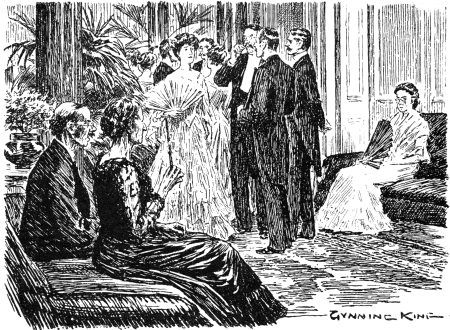
Prof. Gimlet. "Who is that pretty girl those men are talking to?" Miss Bradawl. "Oh, she's nobody; it's strange how some women attract the men; now there's Miss Blinkins over there, such a nice clever girl, and I haven't seen a man speak to her the whole evening."
It is said in "Knight's Guide to Service" that "when for the first time you stand behind your mistress's chair to brush her hair, you may feel that you are placed in a situation of high trust." This, however, depends upon circumstances; for if your mistress dyes her hair, it is a great mark of her confidence to ask you to brush it. If she wears false braids, she is, to a certain extent, in your power; for, as the poet says—
"Should she upbraid,"
you might betray her; but if she is almost bald, and wears a wig, from the moment of your being entrusted to stand behind her chair and brush her hair, you may do what you please with her.
If, in the story of Faustus, Margaret had worn a wig, and Mephistophiles had seen her but once without it, the power of the fiend over her would have been irresistible.
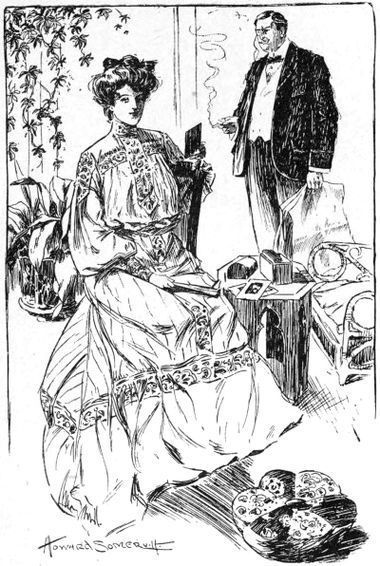
A Difficult Task.—"Jack, dear, I do wish you would get another photo taken." "How often have I told you I will not?" "But why not?" (Then, thoughtfully, after a pause.) "Are you afraid of being asked to look pleasant?"
In your position of lady's-maid, many family secrets will perhaps come to your knowledge. Do not talk of them to your fellow-servants, which would, in fact, be destroying your own valuable monopoly. A servant who knows a great deal of the family affairs cannot be cheaply parted with. You will be secure in your place, and will therefore be in a position to make the most of all its advantages.
The little work we have already alluded to says, that if the lady's-maid is depressed in spirits, "she should open her mind to the friend, whoever it may be, that got her the place." This friend is usually the keeper of a servants' office, who would have enough to do if she were made to bear the infliction of all the unbosomings of all the discontented servants she may have found situations for. This mode of easing your heart would involve the necessity of constantly running out, besides the expense of an occasional omnibus.
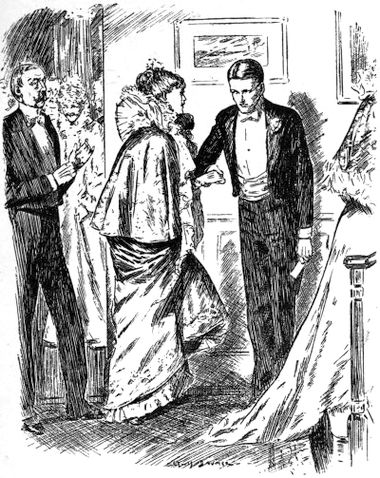
Unhappily Expressed.—She (who did not know they were to meet). "Why, Mr. Brown, this is a pleasant surprise!" He (who did). "I can't altogether say that it is so to me, Miss Jones!"
Manners form an essential part of the qualities of a lady's-maid, and making one's self agreeable is the best mannered thing one can possibly accomplish. This is to be done by praise, for nothing is more agreeable to a lady than flattery. However sensible your mistress may be, she is sure to have a share of female vanity; and even if she knows herself to be ugly altogether, she will fancy she has some redeeming feature. If she squints, praise her complexion; if that is bad, tell her she has beautiful eyes: if she has a dumpty figure, praise her face; and if her countenance is as ugly as sin, tell her that her shape is exquisite. Some people will tell you that sensible women don't like flattery; but this you must not believe; for, however sensible they are, they are pleased by it, particularly when it is administered with so much art as to seem not intended for mere compliment. Very palpable praise is insulting to the generality of ladies; but flattery can scarcely be too gross for some few of them. You should study the character of your mistress, that you may not run the risk of offending her by too much praise, or hurting her by giving too little. Your mistress will sometimes take a journey, and you will then have to pack her things for her. The following directions for packing a lady's portmanteau may, therefore, be of use to you:—Put the lighter dresses at the bottom, for these will not be wanted while travelling; and artificial flowers, wreaths, &c., may go along with them. Insert next a layer of dress caps, and ram well down with heavy dresses, to keep the others in their places. Throw in a sprinkling of shoes, and then add the rest of the wardrobe; cramming-in the marking-ink and the desk at the top, where they are easily got at if they are wanted. Thrust in scissors and hairbrushes anywhere that you can find room for them. Get the footman to cord the box, for it will be a good romp for you, as well as great assistance.
By following these instructions, you will find that you have a tolerably snug place of it.
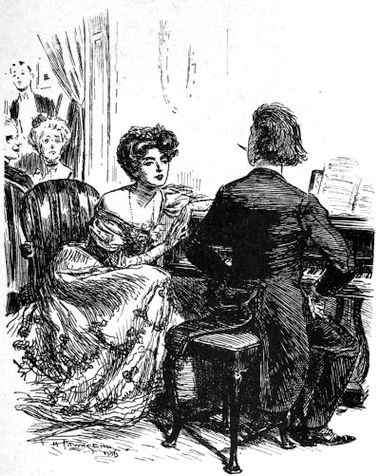
Belle of Balham (to professor, who has just played Chopin's funeral march). "That's awfully jolly! Now play one of Lohengrin's things!"
THE NURSERY-MAID
Any one may undertake the place of a nursery-maid. As every female has, when a girl, been in the habit of carrying, letting fall, snubbing and slapping, either her own or some one else's little brothers and sisters, it is easy to say you have been accustomed to children.
Supposing that you enter service as a nursery-maid, there will, perhaps, be an upper nurse, who will be, in fact, your mistress. Your care at home will be to wait on her; and when walking out, you will have to keep the children at a convenient distance while she flirts with her beau, who will probably be one of the British soldiery. This will be very tantalising to you at first; but you must recollect that your own time will come, if you wait patiently.
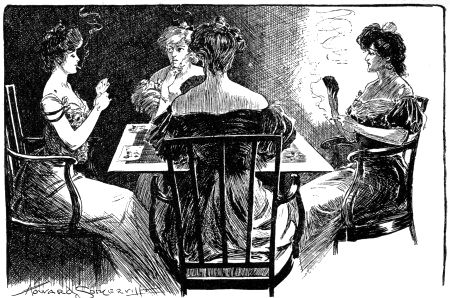
Primum Vivere, Deinde Philosophari.—"Is Florrie's engagement really off, then?" "Oh, yes. Jack wanted her to give up gambling and smoking, and goodness knows what else." (Chorus.) "How absurd!!"
Some places are very different from others. You may go into a wealthy family where the children are kept upstairs, like live lumber, in the nursery, and are only brought out now and then for show, like the horses of the state carriage, or the best tea-set. If you curb their spirits that they may be docile on those occasions, and turn them out to the best advantage as far as appearance is concerned, you will be a favourite with your mistress. In some places you will be what is called "assisted" by the mother; or, in other words, interfered with, just enough to destroy all your attempts at discipline. In this case, your mistress will doubtless tell you, that if you cannot manage the children, she must find someone who can, and will give you warning accordingly.
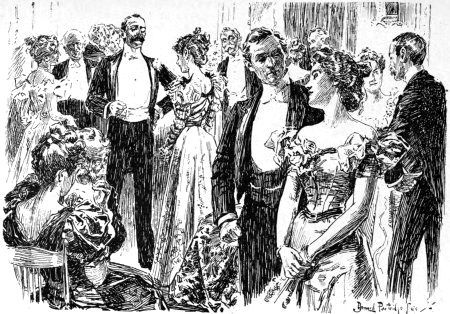
She. "What an enormous expanse of shirt-front Major Armstrong has!"
He. "H'm—it isn't his front I object to. It's his side!"
It is not necessary to give you any particular directions about your dress, for the penny Belle Assemblée will furnish you with all the latest fashions; and you have only to do in cottons and stuffs, what your mistress is doing in silks and satins. You should bear in mind, that you are not obliged to make yourself a dowdy to please any one; for nature has doubtless given you a pretty face, and the gifts of nature ought to be made the most of. Besides, if you are a servant at home, you are a lady out of doors; and you may even keep a parasol at the greengrocer's, to be ready for you when you take a holiday.
When you go to a new place, your mistress will, perhaps, tell you the character of each child, that you may know how to manage their different tempers; but you will, of course, use your own discretion. If one is pointed out as a high-spirited little fellow, you may be sure that he is fond of killing flies, tying toys to the dog's tail, striking you, and crying, as if you had struck him, when he hears his mamma coming. If you are told that one of the dear boys has a turn for finding out how everything is made, and he must not be checked, as his papa intends him for a civil-engineer, you may be sure that the juvenile spirit of inquiry will be shown in pulling your work-box to pieces, unless you turn his attention to the furniture, which he should be encouraged to dissect in preference to any of your property.
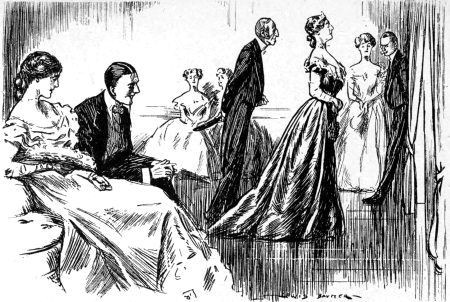
The Latest Little Game.—"The duchess is looking awfully pleased with herself this evenin'. What's the matter?" "What! Haven't you heard? Why, she's just been made editor of the pet poodle page in the Upper Crust Magazine!"
When you have a baby to take care of, some say you should be particular in its food; but if the child cries you have no time for this, and you must stop its mouth with anything that comes handiest. Indiscriminate feeding is said to lay the foundation of diseases which remain with the child through life; but as you do not remain with the child so long, this is not your business. A nurse who knows thoroughly what she is about, will keep a little Godfrey's Cordial, or some other opiate, always at hand—but quite out of sight—to soothe the infant; for nothing is so distressing to the mother, or such a nuisance to yourself, as to hear a child continually crying. When there is only one infant these soothing syrups must be cautiously applied, lest the necessity for a nurse should terminate altogether, and you are thrown out of your situation.
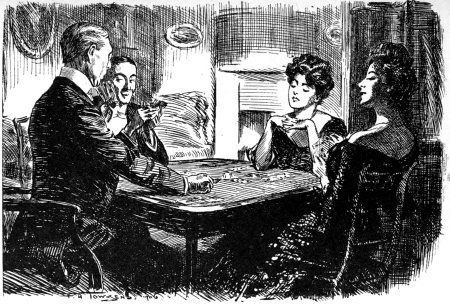
Nervous Player (deprecatingly playing card).—"I really don't know what to play. I'm afraid I've made a fool of myself." Partner (re-assuringly). "That's all right. I don't see what else you could have done!"
An infant sometimes requires example before it will take to its food, and, as it is very nice, you may as well eat one half of it first, to encourage the infant to eat the other. Use sugar in children's food very sparingly, and, lest the infant be tempted to want some of the sugar that is saved out of the quantity allowed, lose no time in locking it up out of sight in your own tea-caddy. If you wish to save your beer-money, recollect that milk is heavy for children, unless mixed copiously with water. As nothing ought to be wasted, you can drink what remains, instead of beer, at your dinner.
There are many very troublesome duties that some nurses undertake in order to amuse the child; but as Nature is acknowledged to be the best nurse, you had better let Nature try her hand at all the hard work, while you confine yourself to that which is easy.
When a child reaches a certain age it will begin to want amusement, when, if there are no toys, you may give it the poker and tongs, or set it down on the floor before the coal-scuttle. Opening and shutting a box is also an amusement; as it involves occasionally the shutting in of the child's own fingers, the operation combines instruction also. As a child may be troublesome while being washed, give it the powder-puff; and as every thing goes to the mouth, the dear little thing will commence sucking the powder-puff, which will keep it quiet.
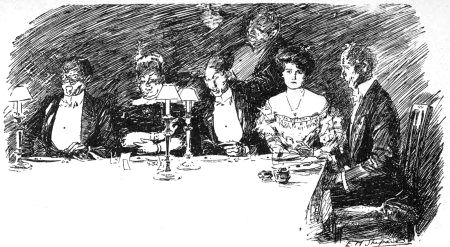
WORKING OUT THEIR OWN SALIVATION
This is not a feast of "funeral baked meats." It is a party of hygienic enthusiasts, following the system by which all food is masticated eighty-five times and then allowed to remain in the mouth till it disappears by involuntary absorption.
A very interesting age in children is when they begin "to take notice." When taking a walk with the children it cannot be expected that you can always have your eyes on them, and you must therefore accustom them to take care of themselves as much as possible. Besides, self-preservation is the first law of Nature, and a child cannot too soon be taught to follow it. Thus, if you are looking about you and the children get into the road, while a carriage is passing, you will probably not be aware of their danger, till it is past, when you will begin slapping and scolding your little charges that they may know better for the future.
It is a very fine thing to encourage generosity in children, and you should therefore talk a great deal about the presents you have received on birth-days and on other occasions from the little dears in the place where you last lived. This will of course give your mistress a hint as to what she ought to do. For the children will naturally ask to be allowed to make you presents, and the parents not liking to check the amiable feeling, and desirous of not being thought shabby in comparison with your former employers, will no doubt give—through the hands of the children—what you may have occasion for.
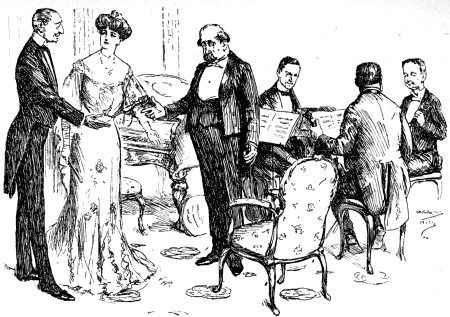
Hostess (introducing first violin to sporting and non-musical guest). "This is Professor Jingelheim, who leads the quartet, you know." Sporting Guest (thinking to be highly complimentary). "Leads—eh—ah—by several lengths, eh—and the rest nowhere! What?"
If you have nephews and nieces you may supply them with many little articles of dress that are pronounced to be "past mending." If your mistress notices that the stock of children's things diminish, you can suggest that "things won't wear for ever," which often passes as an apology for a sensible diminution in the number of socks and pinafores. You may observe that Master So-and-So is such "a spirited little fellow, that he does wear his things out very fast," and your mistress will be satisfied if she thinks her child's spirit has caused half his wardrobe to evaporate.
If you follow all these instructions to the letter, you will make as good a nursery-maid as the best of them.
Hint to Housemaids.—How to destroy flies—encourage spiders.
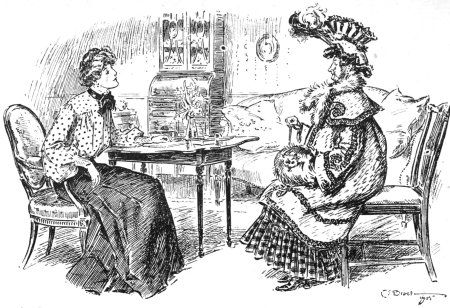
A Matter of Habit.—Lady (engaging new cook). "One thing more. I always like my servants to dress quietly." Applicant. "Oh, there won't be any trouble about that, ma'am. I've got a quiet taste myself."
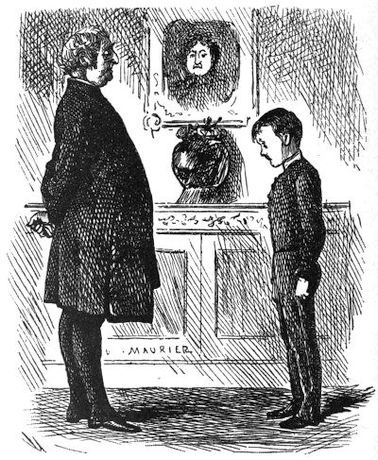
NATURAL RELIGION
Bishop (reproving delinquent page). "Wretched boy! Who is it that sees and hears all we do, and before whom even I am but as a crushed worm?"
Page. "The missus, my lord!"
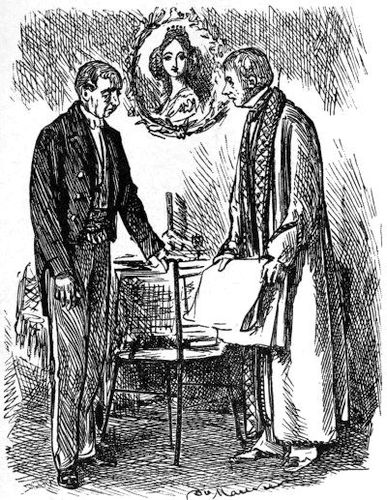
"A Fellow-feeling makes us Wondrous Kind."—"What! going to leave us, James?" "Yes, sir, I'm very sorry, sir, but I really can't put up with missus any longer!" "Ah, James! think how long I've put up with her!"
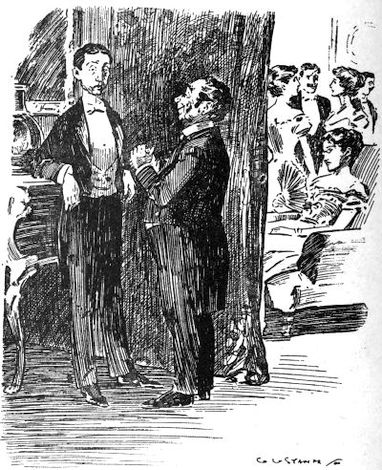
"Yes, she's a nice girl; but I can't get on with her. She has so little to say for herself."
"Oh, but I've been talking to her for the last hour, and she doesn't interrupt. Now, that's what I think so charming!"
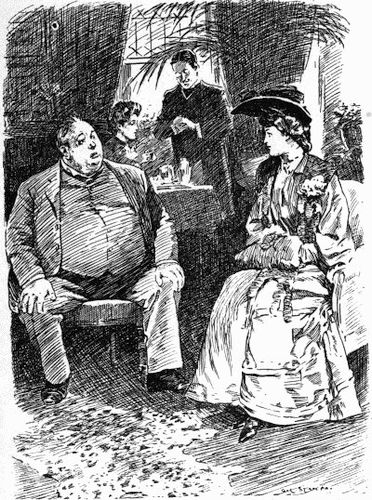
Impossible!—He (relating a thrilling experience), "If I hadn't skipped to one side, I should have been run over! I assure you I had a very narrow escape!"
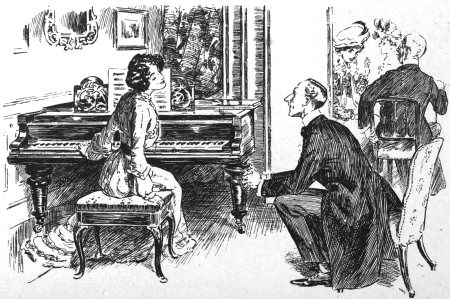
She (having played a little thing for Bertram). "I hope you didn't hear the wrong note!" Bertram (thinking to be complimentary). "Which one?"
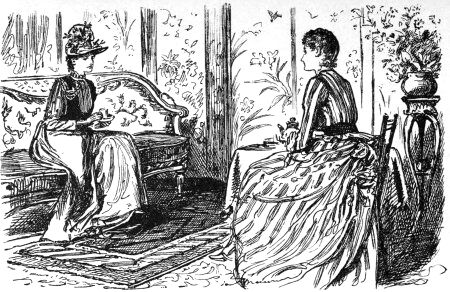
Things One Would Wish To Have Expressed Differently.—(Our semi-detached neighbours.) Grace. "And yet, dear, how little we have seen of each other lately—considering there is only a partition-wall between us!" Emily. "But then, dear, it is such a comfort to feel that you are on the other side!"
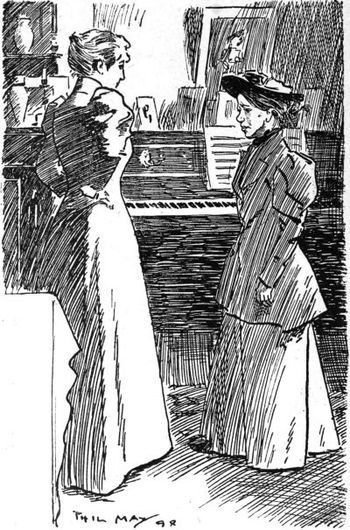
Mistress (about to engage a new housemaid). "Have you had any experience?" Applicant. "Oh yes, mum. I've been in 'undreds of sitiwations!"
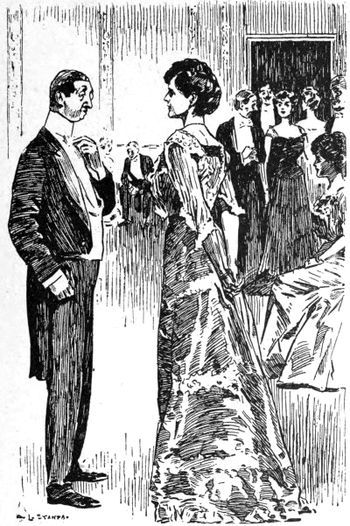
Something New.—Young Ass. "Aw—I'm bored to death with life!" She. "Why don't you do something?" Young Ass. "Aw—there's nothing worth doing that I haven't tried." She. "Isn't there? There must be. Try and think."
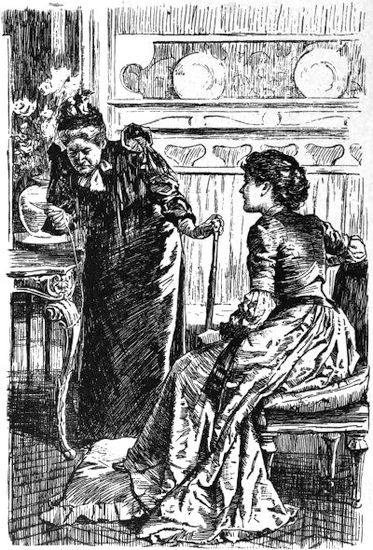
Bric à Brac.—Lady Crœsus. "Oh, what a sweet table! Where did you get it, my dear? Oh, I see here's the man's card." (Spelling the label.) "'Table—Louis Quinze.' Louis Quinzey! What a horrid name! and why hasn't he put his address?"
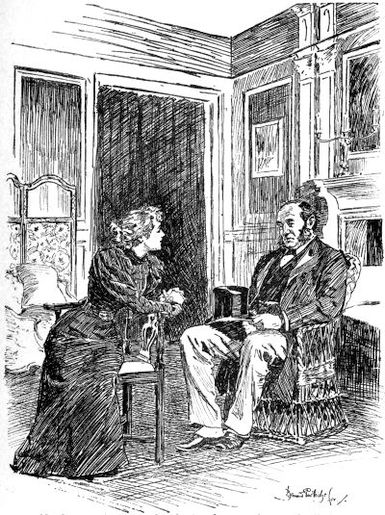
Mr. Boreham (who has already stayed over an hour and talked about himself the whole time). "Yes, I'm sorry to say I'm a martyr to insomnia. I've tried everything, but I cannot get sleep at night!"
His Hostess (sweetly). "Oh, but I can tell you a very simple remedy. You should talk to yourself—after going to bed!"
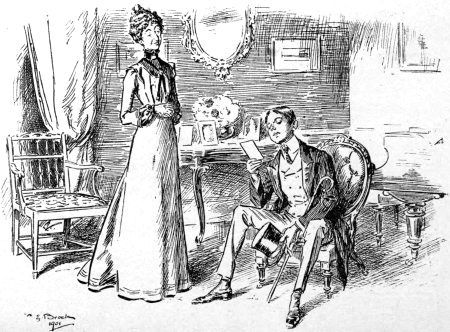
Miss Withers (showing photograph of herself). "I'm afraid it's rather faded."
Binks (inexperienced, aged nineteen). "Yes, but it's just like you."
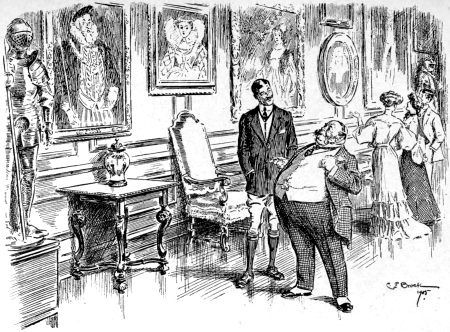
In the Picture Gallery of the Earls of Longline.—Sir Peter Stodgely.—"Curious thing your family should all be took in fancy dress! I s'pose they're all by the same man, eh?"
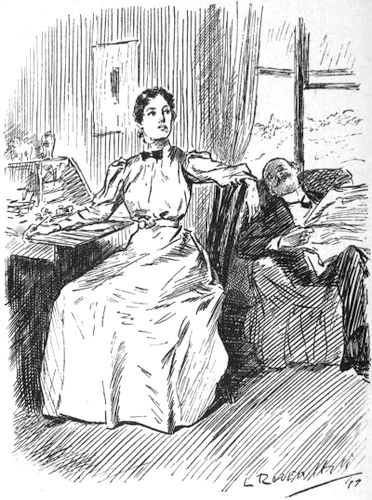
Our Domestics.—"Listen Jack. I've put down 'kitchen and scullery maids kept; only two in family; beer allowed; no dairy; extra help when required.' Now, can you suggest any other inducement I can offer?" "Well—you might add 'charming scenery!'"
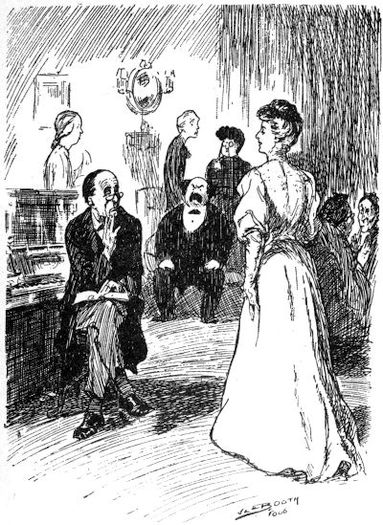
"——BUT THOSE UNHEARD ARE SWEETER"
Scene—A Boarding-house.
Wife. "Why do you always sit at the piano, David? You know you can't play a note!"
David. "Neither can anyone else, while I am here!"
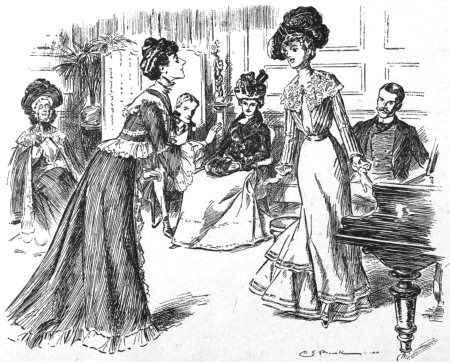
Hostess. "Please don't leave off, Miss Jessop." Miss J. "But shan't I bore you? It is possible to have too much of a good thing, you know." Hostess. "Yes; but that doesn't apply to your playing!"
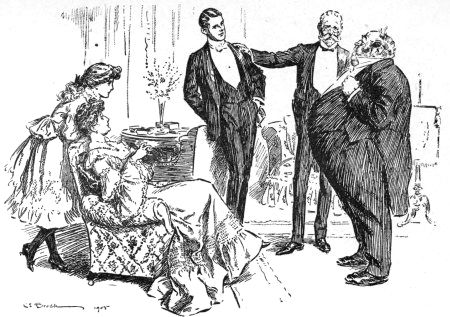
What Shall we do with our Boys?—Father. "Now, Sir William, I want Jack to go into business—his mother wants him to read for the Bar. Jack's undecided. What do you advise?" Sir William Grubbe. "You go into business, my boy. See what it's made me!" Jack (emphatically). "Oh, Sir William, I've quite decided to take the mater's advice."
New Maidservant (much pleased with herself). A gentleman called to see you, sir, and said as he were just leavin' town for some time. Knowin' as you didn't want to be disturbed this morning, I told him as you was hout—
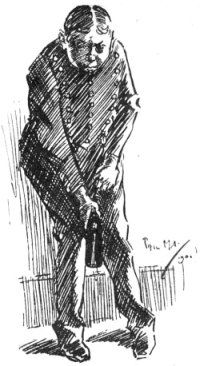
"A PAGE DRAWING"
Master. Quite right. (To himself) Sharp girl this!
New Maid (cheerfully)—and told him as I didn't know when you'd be back again. 'Is card's in the 'all, sir. He 'ave wrote somethin' on it.
[She fetches it, returns, and presents it.
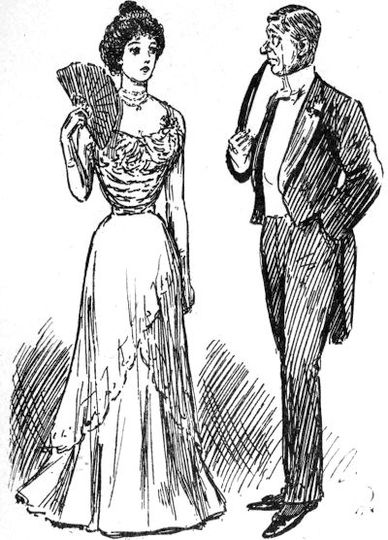
SNUBBING
He. "Sorry I forgot your party the other evening!"
She. "Oh, weren't you there?"
Master (reads writing on card, then suddenly springing up, exclaims) Oh—(stops the escape of a very strong expletive)—How long ago?
New Maid (cheerfully). Oh, quite a hour. There was luggidge on the cab.
Master (subsiding hopelessly in chair, to Maid). You can go. (Alone, grinding his teeth.) Confound the idiot! (Reads card muttering to himself.) Snooker Poole, Chork Cottage, Kew. "Called to repay coin personally. Sorry to miss you. So long!" I shall never see my hundred and fifty again!... That's the worst of new servants!
[He is left considering whether it would not be as well to alter the form of his instructions to the hand-maiden. Scene closes.
The Boastfulness of Belinda.—Arabella (concluding the description of the magnificence of her employer's home). And in the servants' 'all we 'as 'ot plovers' heggs ev'ry mornin' for brekfist.
Belinda. That's nothin'. At hour 'ouse hall the fires is laid with reel sparrow-grass sticks instead of wood!
[Arabella dries up.
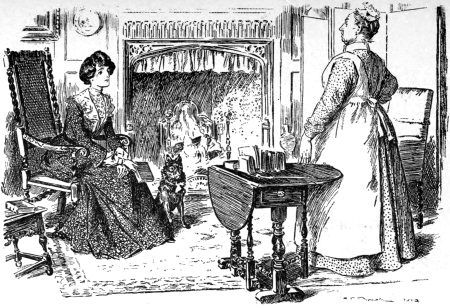
Inexperienced and anxious Young Mistress. "The new housemaid, Maria, is a Roman Catholic but I hope you will not allow any religious controversy in the servants' hall."
Cook (with much dignity). "You needn't have any fear, my lady. In really 'igh class families religion is never mentioned!"
(With acknowledgments to the "World and his Wife")
HOW TO MAKE OLD PICTURES LOOK NEW.
Many houses have pictures darkened with age which only need a little drastic treatment to make them as fresh and bright as new oleographs. The surface should first be soaked in a strong solution of hydrochloric acid and then rubbed with an old nail-brush. Any paint that should chance to be removed can easily be supplied by a local artist for a few pence. We heard of a Sir Joshua Reynolds which was treated like this the other day in its owner's absence, and on his return was mistaken by him for a Christmas supplement.
TO REVIVE KID.
Give the kid a stiff brandy-and-soda.
A PRETTY USE FOR OLD BOOTS.
It is a mistake to throw away old boots as useless, or to waste them on newly-married couples. A most charming effect can be obtained by planting a fern in the heel and hanging the boot from the ceiling in the window. Any kind of fern will do.
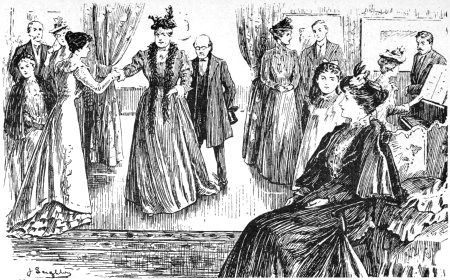
No Doubt of it.—Daughter of the House. "Here come Mrs. Massington and her husband." Lady Smart. "Ah, she's strong-minded, of course!" Daughter of the House. "Can you tell that by just looking at her?" Lady Smart. "No—by looking at him!"
TO REMOVE STAINS ON THE CEILING.
The best thing to do is to re-whitewash the whole surface, which is done by lying on one's back on the top of the bookshelves and dabbing away steadily. But if the stain still shows through it is best to spill water systematically on the floor of the room above until you have stained the ceiling uniformly, leaving it a russet brown. After all, why should ceilings be white?
TO REDDEN LOBSTER.
Take a saucepan of boiling water and plunge the lobster in. It will emerge quite red and lovable.
TO RENOVATE BLACK LACE.
Wash in beer, beat between the folds of a linen cloth, and, when nearly dry, iron with a cool (not cold) iron. It is not advisable to drink the beer unless you are very thirsty. Good housewives find a way of getting it back into the kitchen cask.
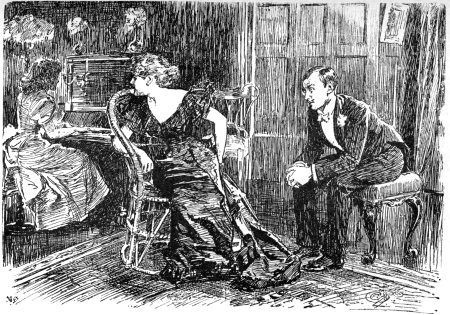
Resource!—Young Mr. Softly. "Er—Miss Ethel, there is something I—er—particularly want to say to you. Er—when could I have a minute with you alone?" Miss Ethel. "Oh, that's all right! Something from Wagner, please, Lucy! Now, Mr. Softly!"
TO REMOVE INK STAINS FROM THE FINGERS.
Fill your mouth with spirits of salt and then suck the fingers thoroughly.
TO REMOVE STAINED PATCHES FROM THE WALL PAPER.
This cannot be done. The only things to do are (a) re-paper entirely, or (b) re-arrange the furniture to hide the places.
TO REVIVE OSTRICH FEATHERS.
Soak the feathers in the best Australian wine (Emu brand), and then bury them up to the hilt in the sand. If the feathers still remain unconscious apply a hot-water bottle.
TO EXTRICATE MOTH FROM FUR.
Stimulate the moths by smelling-salts, and when they begin to show signs of activity remove the furs into a dark room lit by several strong wax candles. The moths will immediately quit the furs and rush into the flames of the candles.
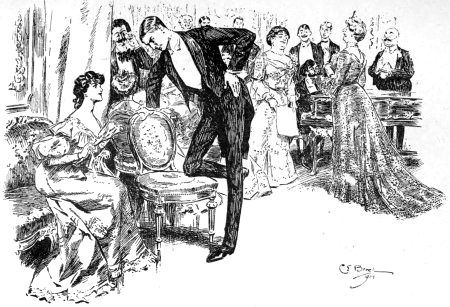
Son of the House. "Won't you sing something, Miss Muriel?"
Miss M. "Oh, I daren't after such good music as we have been listening to."
Son of the House. "But I'd rather listen to your singing than to any amount of good music!"
TO REMOVE MARMALADE FROM VELVET.
Immerse in a lather of white soap in hot water, and, after rinsing and dabbing firmly for five minutes, apply benzoline with a nutmeg-grater. If the marmalade then refuses to go, send for the police.
HOW TO LIGHT A FIRE WITH CELLULOID COLLARS.
Heat the collar over a gas jet until it begins to crack, then apply a fusee and thrust the collar between the bars of the grate.
THE AMENDE HONOURABLE
A "TIMES" QUERY ANSWERED
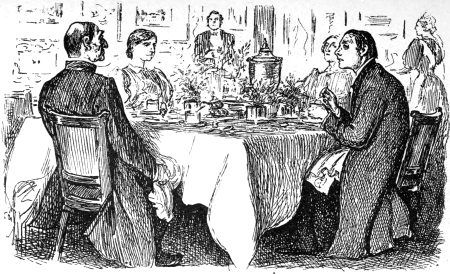
TRUE HUMILITY
Right Reverend Host. "I'm afraid you've got a bad egg, Mr. Jones!"
The Curate. "On no, my lord, I assure you! Parts of it are excellent!"
For both sexes at various ages
AT FIVE.
She. Will my new doll open and shut her eyes?
He. Off to a party! Will they have mince-pies?
AT TEN.
She. Will pretty Master Smith be there this time?
He. Will Uncle take me to the pantomime?
She. Will Mamma let me wear my hair in curl?
He. I say, how many l's are there in "girl"?
AT FIFTEEN.
She. Will he give me or Fan the first round dance?
He. Will our chaps at the wickets have a chance?
She. Will my next dress be made with longer skirts.
He. Hoisted? O crikey! Wonder if it hurts?[Pg 181]
She. Did that sly Fanny hear him call me "dear"?
He. I wonder if this "weed" will turn me queer?
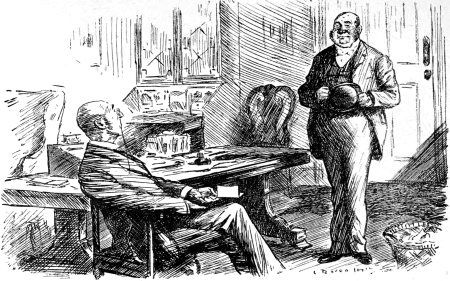
Employer (to applicant for situation). "And then I am very particular about my cellars; you understand wine, I presume?" Butler. "Hin my last sitiwation, sir, I was considered a very tolerable judge o' wine, sir."
AT TWENTY.
She. Will Papa think dear Percy's "screw" too small?
He. Does this moustache mean to come on at all?
She. Was it my eyes with which he seemed so struck?
He. Is it a "pass," I wonder, or a "pluck"?
She. I wonder whether He will "pop" tonight?
He. I wonder whether She will answer right?
AT TWENTY-FIVE.
She. Shall I, oh shall I, have a chance this season?
He. A stiffish total! Will there be a breeze on?
She. Quite pale! Shall I put on the tiniest touch?
He. Most brilliant! Wonder if she rouges much?
She. Not a bad figure! Has he any tin?
He. Backed "Slowboy" for a pot! D'ye think he'll win?
She. Long dress bill! Shall I get into hot water?
He. Can I stave off old Snip another quarter?
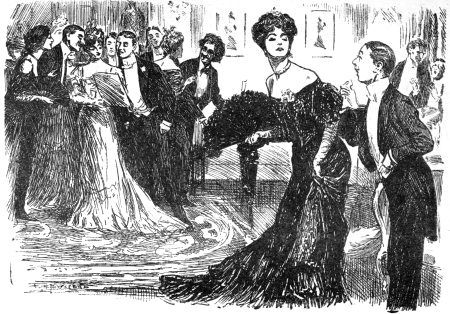
Hostess. "Don't you sing, Mr. Binks?" Binks. "No—er—I—hum—er——" Hostess. "Oh, I'm afraid you wouldn't be heard in this large room. Thanks, so much!"
[Terrible disappointment of Binks, who was simply dying to recite "Tam o' Shanter."
AT THIRTY.
She. Will the new curate be engaged or not?
He. Close thing! Shall I have nerve to make the shot?
She. Is flirting really now a sort of sinning?
He. Is my neat middle parting really thinning?
She. Now shall I get a partner for this dance?
He. Old Boodles leaving! Shall I have a chance?
She. Engaged at last! Now will he keep a carriage?
He. That's done! How shall I like the yoke of marriage?
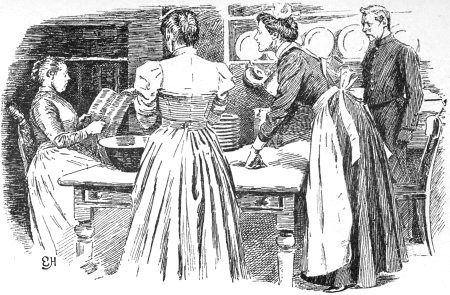
A Serious Case.—Cook (reading from daily paper). "Last night's official statement shows that there are fifty thousand cases of influenza in the metropolis." Nervous Parlourmaid. "Oh, Mary! And how many are there in a case?"
AT FORTY.
She. When will the major come up to the scratch?
He. Fat, plain and forty! Shall I risk the match?
She. Is that a tinge of red about my nose?
He. Does the grey show—unless one looks too close?
She. Could I get on those "sixes" at a pinch?
He. Must I allow the vest another inch?
She. Did Lady Linda mean that as a snub?
He. Will they blackball me at the Buffers' Club?
She. Is the dear fellow right about confession?
He. How stands my chance if they dissolve this session.
AT FIFTY.
She. Will Flora hook the wealthy cotton-spinner?
He. Must I drop drinking port wine after dinner?
She. Not meet! Great Heavens! Am I getting stout?
He. By Jingo, was that twinge a touch of gout?
She. Did he mean anything by that warm glance?[Pg 187]
He. Shall I have "go" to get through this round dance?[Pg 188]
She. Will it be Brighton or the Continent?
He. My dear, can that last cheque be wholly spent?
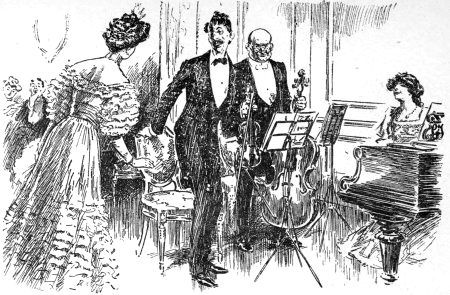
Violinist (one of trio of amateurs who have just obliged with rather lengthy performance). "Well, we've left off at last!" Hostess. "Thank you so much!"
AT SIXTY.
She. Will Lady Jane before those Jones's bow?
He. Shall I, I wonder, get my knighthood now?
She. Doctor, dear doctor, what does ail my back?
He. Will Lord Fitz-Faddle give that berth to Jack?
She. Is Nelly really sweet on that young Brown?
He. Are Costa Ricas going up or down?
She. He seemed so sparkish! Is it quite too late?
He. Dull, this! Am I too old a bird to mate?
OUTRAGE ON GOLDSMITH
(By a sleepy housemaid, concerning missus)
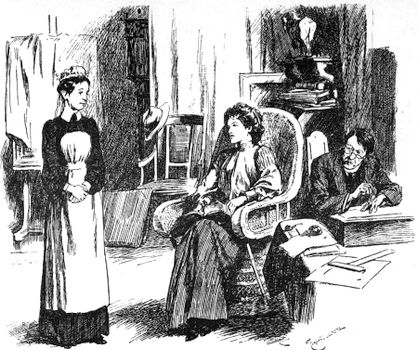
New Year's Fete and Gala.—"Well, Jane, did you have a good time at home? Was the village very gay?" "Yes, thank you, mum. But we was rather disappointed, as the policemen's feet didn't come off!"
Cutting!—Host. "What bin did you put that Marsala in, Muggles?"
New Butler. "In the—ah—dust-bin, sir!!"
Social Gardening.—Cultivating an acquaintance.
Q. What's the difference between a fraudulent Bank Director and a Servants' Registry Office?
A. The former cooks books, the latter books cooks.
The Sublime.—The fashions of this season.
The Ridiculous.—The fashions of last season.
MUFFS AND MARQUISATES
Lord M's a muff; but shrewd mammas determine
Muffs have a value when they're trimmed with ermine!
The best French Exercises for Girls.—A series of practical studies in cookery à la Française.
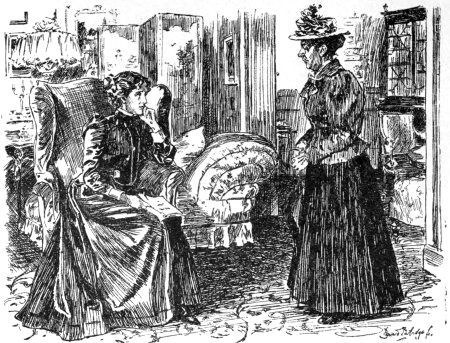
Mistress. "Well now, what can you cook?" Applicant. "Oh, I can cook any-think, mum." Mistress. "What about entrées?" Applicant. "Yes, I can do ontrays, mum." Mistress. "Can you do a vol-au-vent?" Applicant (doubtfully). "Well, mum, in my last place there was once some talk about a vollervong, but it fell through."
Clerical Æsthetics.—Fair Parishioner. "And do you like the pulpit, Mr. Auriol?"
The New Curate. "I do not. Er—it hides too much of the figure, and I like every shake of the surplice to tell!"
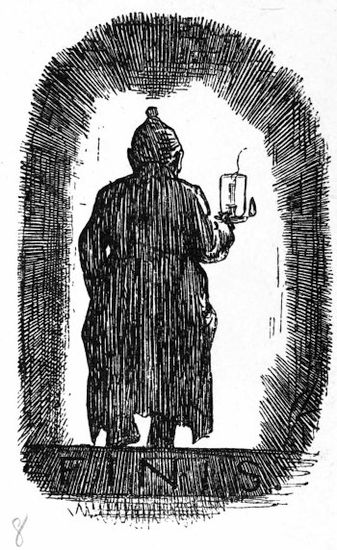
BRADBURY, AGNEW, & CO. LD., PRINTERS LONDON AND TONBRIDGE.
Transcriber's Notes
Typographical errors have been silently corrected.
Variations in spelling, hyphenation and accents are as in the original.
End of the Project Gutenberg EBook of Mr. Punch At Home, by Various
*** END OF THIS PROJECT GUTENBERG EBOOK MR. PUNCH AT HOME ***
***** This file should be named 47718-h.htm or 47718-h.zip *****
This and all associated files of various formats will be found in:
http://www.gutenberg.org/4/7/7/1/47718/
Produced by Chris Curnow, Les Galloway and the Online
Distributed Proofreading Team at http://www.pgdp.net
Updated editions will replace the previous one--the old editions
will be renamed.
Creating the works from public domain print editions means that no
one owns a United States copyright in these works, so the Foundation
(and you!) can copy and distribute it in the United States without
permission and without paying copyright royalties. Special rules,
set forth in the General Terms of Use part of this license, apply to
copying and distributing Project Gutenberg-tm electronic works to
protect the PROJECT GUTENBERG-tm concept and trademark. Project
Gutenberg is a registered trademark, and may not be used if you
charge for the eBooks, unless you receive specific permission. If you
do not charge anything for copies of this eBook, complying with the
rules is very easy. You may use this eBook for nearly any purpose
such as creation of derivative works, reports, performances and
research. They may be modified and printed and given away--you may do
practically ANYTHING with public domain eBooks. Redistribution is
subject to the trademark license, especially commercial
redistribution.
*** START: FULL LICENSE ***
THE FULL PROJECT GUTENBERG LICENSE
PLEASE READ THIS BEFORE YOU DISTRIBUTE OR USE THIS WORK
To protect the Project Gutenberg-tm mission of promoting the free
distribution of electronic works, by using or distributing this work
(or any other work associated in any way with the phrase "Project
Gutenberg"), you agree to comply with all the terms of the Full Project
Gutenberg-tm License available with this file or online at
www.gutenberg.org/license.
Section 1. General Terms of Use and Redistributing Project Gutenberg-tm
electronic works
1.A. By reading or using any part of this Project Gutenberg-tm
electronic work, you indicate that you have read, understand, agree to
and accept all the terms of this license and intellectual property
(trademark/copyright) agreement. If you do not agree to abide by all
the terms of this agreement, you must cease using and return or destroy
all copies of Project Gutenberg-tm electronic works in your possession.
If you paid a fee for obtaining a copy of or access to a Project
Gutenberg-tm electronic work and you do not agree to be bound by the
terms of this agreement, you may obtain a refund from the person or
entity to whom you paid the fee as set forth in paragraph 1.E.8.
1.B. "Project Gutenberg" is a registered trademark. It may only be
used on or associated in any way with an electronic work by people who
agree to be bound by the terms of this agreement. There are a few
things that you can do with most Project Gutenberg-tm electronic works
even without complying with the full terms of this agreement. See
paragraph 1.C below. There are a lot of things you can do with Project
Gutenberg-tm electronic works if you follow the terms of this agreement
and help preserve free future access to Project Gutenberg-tm electronic
works. See paragraph 1.E below.
1.C. The Project Gutenberg Literary Archive Foundation ("the Foundation"
or PGLAF), owns a compilation copyright in the collection of Project
Gutenberg-tm electronic works. Nearly all the individual works in the
collection are in the public domain in the United States. If an
individual work is in the public domain in the United States and you are
located in the United States, we do not claim a right to prevent you from
copying, distributing, performing, displaying or creating derivative
works based on the work as long as all references to Project Gutenberg
are removed. Of course, we hope that you will support the Project
Gutenberg-tm mission of promoting free access to electronic works by
freely sharing Project Gutenberg-tm works in compliance with the terms of
this agreement for keeping the Project Gutenberg-tm name associated with
the work. You can easily comply with the terms of this agreement by
keeping this work in the same format with its attached full Project
Gutenberg-tm License when you share it without charge with others.
1.D. The copyright laws of the place where you are located also govern
what you can do with this work. Copyright laws in most countries are in
a constant state of change. If you are outside the United States, check
the laws of your country in addition to the terms of this agreement
before downloading, copying, displaying, performing, distributing or
creating derivative works based on this work or any other Project
Gutenberg-tm work. The Foundation makes no representations concerning
the copyright status of any work in any country outside the United
States.
1.E. Unless you have removed all references to Project Gutenberg:
1.E.1. The following sentence, with active links to, or other immediate
access to, the full Project Gutenberg-tm License must appear prominently
whenever any copy of a Project Gutenberg-tm work (any work on which the
phrase "Project Gutenberg" appears, or with which the phrase "Project
Gutenberg" is associated) is accessed, displayed, performed, viewed,
copied or distributed:
This eBook is for the use of anyone anywhere at no cost and with
almost no restrictions whatsoever. You may copy it, give it away or
re-use it under the terms of the Project Gutenberg License included
with this eBook or online at www.gutenberg.org
1.E.2. If an individual Project Gutenberg-tm electronic work is derived
from the public domain (does not contain a notice indicating that it is
posted with permission of the copyright holder), the work can be copied
and distributed to anyone in the United States without paying any fees
or charges. If you are redistributing or providing access to a work
with the phrase "Project Gutenberg" associated with or appearing on the
work, you must comply either with the requirements of paragraphs 1.E.1
through 1.E.7 or obtain permission for the use of the work and the
Project Gutenberg-tm trademark as set forth in paragraphs 1.E.8 or
1.E.9.
1.E.3. If an individual Project Gutenberg-tm electronic work is posted
with the permission of the copyright holder, your use and distribution
must comply with both paragraphs 1.E.1 through 1.E.7 and any additional
terms imposed by the copyright holder. Additional terms will be linked
to the Project Gutenberg-tm License for all works posted with the
permission of the copyright holder found at the beginning of this work.
1.E.4. Do not unlink or detach or remove the full Project Gutenberg-tm
License terms from this work, or any files containing a part of this
work or any other work associated with Project Gutenberg-tm.
1.E.5. Do not copy, display, perform, distribute or redistribute this
electronic work, or any part of this electronic work, without
prominently displaying the sentence set forth in paragraph 1.E.1 with
active links or immediate access to the full terms of the Project
Gutenberg-tm License.
1.E.6. You may convert to and distribute this work in any binary,
compressed, marked up, nonproprietary or proprietary form, including any
word processing or hypertext form. However, if you provide access to or
distribute copies of a Project Gutenberg-tm work in a format other than
"Plain Vanilla ASCII" or other format used in the official version
posted on the official Project Gutenberg-tm web site (www.gutenberg.org),
you must, at no additional cost, fee or expense to the user, provide a
copy, a means of exporting a copy, or a means of obtaining a copy upon
request, of the work in its original "Plain Vanilla ASCII" or other
form. Any alternate format must include the full Project Gutenberg-tm
License as specified in paragraph 1.E.1.
1.E.7. Do not charge a fee for access to, viewing, displaying,
performing, copying or distributing any Project Gutenberg-tm works
unless you comply with paragraph 1.E.8 or 1.E.9.
1.E.8. You may charge a reasonable fee for copies of or providing
access to or distributing Project Gutenberg-tm electronic works provided
that
- You pay a royalty fee of 20% of the gross profits you derive from
the use of Project Gutenberg-tm works calculated using the method
you already use to calculate your applicable taxes. The fee is
owed to the owner of the Project Gutenberg-tm trademark, but he
has agreed to donate royalties under this paragraph to the
Project Gutenberg Literary Archive Foundation. Royalty payments
must be paid within 60 days following each date on which you
prepare (or are legally required to prepare) your periodic tax
returns. Royalty payments should be clearly marked as such and
sent to the Project Gutenberg Literary Archive Foundation at the
address specified in Section 4, "Information about donations to
the Project Gutenberg Literary Archive Foundation."
- You provide a full refund of any money paid by a user who notifies
you in writing (or by e-mail) within 30 days of receipt that s/he
does not agree to the terms of the full Project Gutenberg-tm
License. You must require such a user to return or
destroy all copies of the works possessed in a physical medium
and discontinue all use of and all access to other copies of
Project Gutenberg-tm works.
- You provide, in accordance with paragraph 1.F.3, a full refund of any
money paid for a work or a replacement copy, if a defect in the
electronic work is discovered and reported to you within 90 days
of receipt of the work.
- You comply with all other terms of this agreement for free
distribution of Project Gutenberg-tm works.
1.E.9. If you wish to charge a fee or distribute a Project Gutenberg-tm
electronic work or group of works on different terms than are set
forth in this agreement, you must obtain permission in writing from
both the Project Gutenberg Literary Archive Foundation and Michael
Hart, the owner of the Project Gutenberg-tm trademark. Contact the
Foundation as set forth in Section 3 below.
1.F.
1.F.1. Project Gutenberg volunteers and employees expend considerable
effort to identify, do copyright research on, transcribe and proofread
public domain works in creating the Project Gutenberg-tm
collection. Despite these efforts, Project Gutenberg-tm electronic
works, and the medium on which they may be stored, may contain
"Defects," such as, but not limited to, incomplete, inaccurate or
corrupt data, transcription errors, a copyright or other intellectual
property infringement, a defective or damaged disk or other medium, a
computer virus, or computer codes that damage or cannot be read by
your equipment.
1.F.2. LIMITED WARRANTY, DISCLAIMER OF DAMAGES - Except for the "Right
of Replacement or Refund" described in paragraph 1.F.3, the Project
Gutenberg Literary Archive Foundation, the owner of the Project
Gutenberg-tm trademark, and any other party distributing a Project
Gutenberg-tm electronic work under this agreement, disclaim all
liability to you for damages, costs and expenses, including legal
fees. YOU AGREE THAT YOU HAVE NO REMEDIES FOR NEGLIGENCE, STRICT
LIABILITY, BREACH OF WARRANTY OR BREACH OF CONTRACT EXCEPT THOSE
PROVIDED IN PARAGRAPH 1.F.3. YOU AGREE THAT THE FOUNDATION, THE
TRADEMARK OWNER, AND ANY DISTRIBUTOR UNDER THIS AGREEMENT WILL NOT BE
LIABLE TO YOU FOR ACTUAL, DIRECT, INDIRECT, CONSEQUENTIAL, PUNITIVE OR
INCIDENTAL DAMAGES EVEN IF YOU GIVE NOTICE OF THE POSSIBILITY OF SUCH
DAMAGE.
1.F.3. LIMITED RIGHT OF REPLACEMENT OR REFUND - If you discover a
defect in this electronic work within 90 days of receiving it, you can
receive a refund of the money (if any) you paid for it by sending a
written explanation to the person you received the work from. If you
received the work on a physical medium, you must return the medium with
your written explanation. The person or entity that provided you with
the defective work may elect to provide a replacement copy in lieu of a
refund. If you received the work electronically, the person or entity
providing it to you may choose to give you a second opportunity to
receive the work electronically in lieu of a refund. If the second copy
is also defective, you may demand a refund in writing without further
opportunities to fix the problem.
1.F.4. Except for the limited right of replacement or refund set forth
in paragraph 1.F.3, this work is provided to you 'AS-IS', WITH NO OTHER
WARRANTIES OF ANY KIND, EXPRESS OR IMPLIED, INCLUDING BUT NOT LIMITED TO
WARRANTIES OF MERCHANTABILITY OR FITNESS FOR ANY PURPOSE.
1.F.5. Some states do not allow disclaimers of certain implied
warranties or the exclusion or limitation of certain types of damages.
If any disclaimer or limitation set forth in this agreement violates the
law of the state applicable to this agreement, the agreement shall be
interpreted to make the maximum disclaimer or limitation permitted by
the applicable state law. The invalidity or unenforceability of any
provision of this agreement shall not void the remaining provisions.
1.F.6. INDEMNITY - You agree to indemnify and hold the Foundation, the
trademark owner, any agent or employee of the Foundation, anyone
providing copies of Project Gutenberg-tm electronic works in accordance
with this agreement, and any volunteers associated with the production,
promotion and distribution of Project Gutenberg-tm electronic works,
harmless from all liability, costs and expenses, including legal fees,
that arise directly or indirectly from any of the following which you do
or cause to occur: (a) distribution of this or any Project Gutenberg-tm
work, (b) alteration, modification, or additions or deletions to any
Project Gutenberg-tm work, and (c) any Defect you cause.
Section 2. Information about the Mission of Project Gutenberg-tm
Project Gutenberg-tm is synonymous with the free distribution of
electronic works in formats readable by the widest variety of computers
including obsolete, old, middle-aged and new computers. It exists
because of the efforts of hundreds of volunteers and donations from
people in all walks of life.
Volunteers and financial support to provide volunteers with the
assistance they need are critical to reaching Project Gutenberg-tm's
goals and ensuring that the Project Gutenberg-tm collection will
remain freely available for generations to come. In 2001, the Project
Gutenberg Literary Archive Foundation was created to provide a secure
and permanent future for Project Gutenberg-tm and future generations.
To learn more about the Project Gutenberg Literary Archive Foundation
and how your efforts and donations can help, see Sections 3 and 4
and the Foundation information page at www.gutenberg.org
Section 3. Information about the Project Gutenberg Literary Archive
Foundation
The Project Gutenberg Literary Archive Foundation is a non profit
501(c)(3) educational corporation organized under the laws of the
state of Mississippi and granted tax exempt status by the Internal
Revenue Service. The Foundation's EIN or federal tax identification
number is 64-6221541. Contributions to the Project Gutenberg
Literary Archive Foundation are tax deductible to the full extent
permitted by U.S. federal laws and your state's laws.
The Foundation's principal office is located at 4557 Melan Dr. S.
Fairbanks, AK, 99712., but its volunteers and employees are scattered
throughout numerous locations. Its business office is located at 809
North 1500 West, Salt Lake City, UT 84116, (801) 596-1887. Email
contact links and up to date contact information can be found at the
Foundation's web site and official page at www.gutenberg.org/contact
For additional contact information:
Dr. Gregory B. Newby
Chief Executive and Director
gbnewby@pglaf.org
Section 4. Information about Donations to the Project Gutenberg
Literary Archive Foundation
Project Gutenberg-tm depends upon and cannot survive without wide
spread public support and donations to carry out its mission of
increasing the number of public domain and licensed works that can be
freely distributed in machine readable form accessible by the widest
array of equipment including outdated equipment. Many small donations
($1 to $5,000) are particularly important to maintaining tax exempt
status with the IRS.
The Foundation is committed to complying with the laws regulating
charities and charitable donations in all 50 states of the United
States. Compliance requirements are not uniform and it takes a
considerable effort, much paperwork and many fees to meet and keep up
with these requirements. We do not solicit donations in locations
where we have not received written confirmation of compliance. To
SEND DONATIONS or determine the status of compliance for any
particular state visit www.gutenberg.org/donate
While we cannot and do not solicit contributions from states where we
have not met the solicitation requirements, we know of no prohibition
against accepting unsolicited donations from donors in such states who
approach us with offers to donate.
International donations are gratefully accepted, but we cannot make
any statements concerning tax treatment of donations received from
outside the United States. U.S. laws alone swamp our small staff.
Please check the Project Gutenberg Web pages for current donation
methods and addresses. Donations are accepted in a number of other
ways including checks, online payments and credit card donations.
To donate, please visit: www.gutenberg.org/donate
Section 5. General Information About Project Gutenberg-tm electronic
works.
Professor Michael S. Hart was the originator of the Project Gutenberg-tm
concept of a library of electronic works that could be freely shared
with anyone. For forty years, he produced and distributed Project
Gutenberg-tm eBooks with only a loose network of volunteer support.
Project Gutenberg-tm eBooks are often created from several printed
editions, all of which are confirmed as Public Domain in the U.S.
unless a copyright notice is included. Thus, we do not necessarily
keep eBooks in compliance with any particular paper edition.
Most people start at our Web site which has the main PG search facility:
www.gutenberg.org
This Web site includes information about Project Gutenberg-tm,
including how to make donations to the Project Gutenberg Literary
Archive Foundation, how to help produce our new eBooks, and how to
subscribe to our email newsletter to hear about new eBooks.